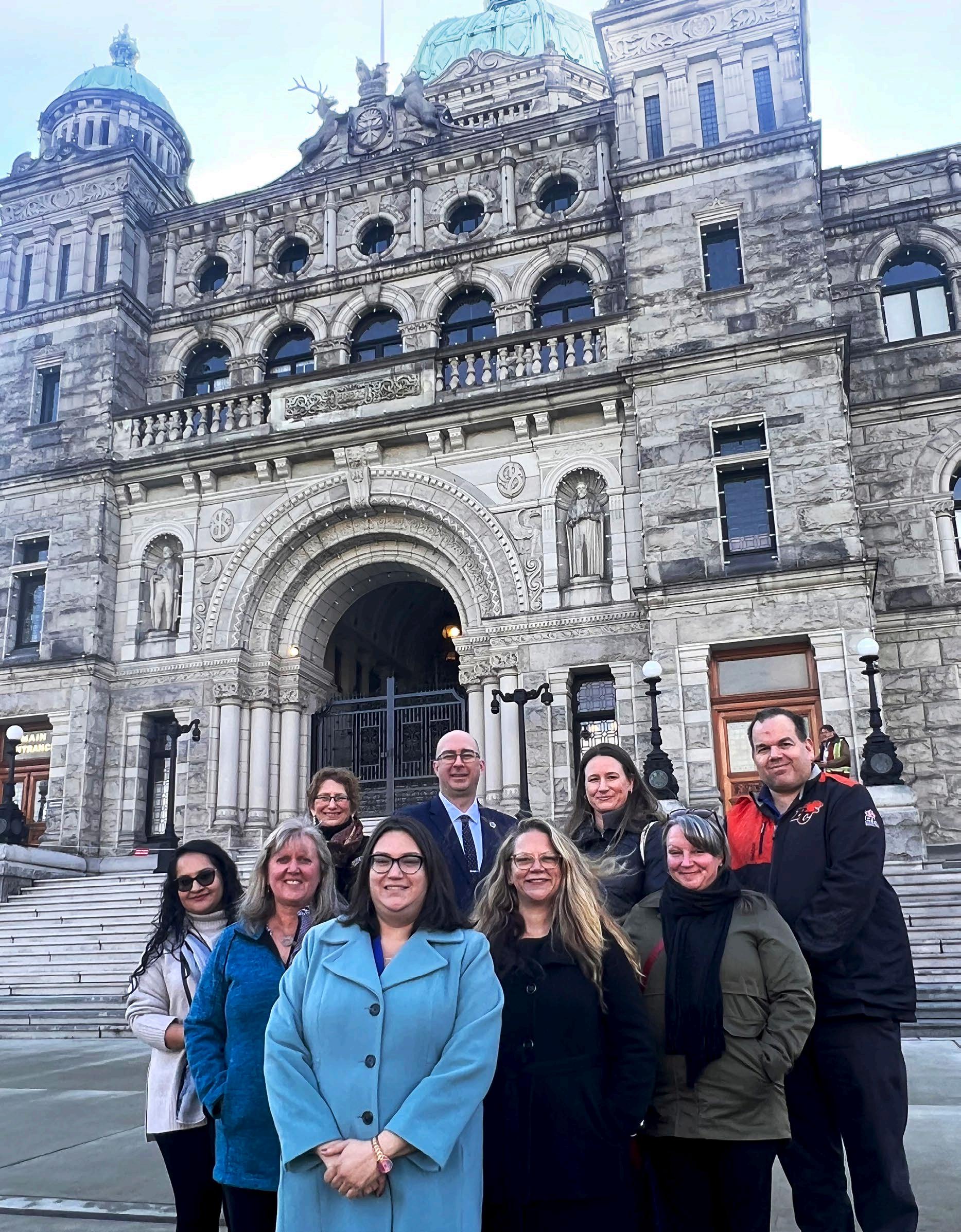

EMPLOYEE PUBLICWINTER 2022-23 FRONT AND CENTRE CUBA VISIT | CAMBIE CLINIC FIGHT | CHILDCARE UPDATE | UBC ORGANIZING BARGAINING FEATURE Building for a better future CUPE MEMBERS TAKE THE LEAD ON ACTIVISM, CHANGE
I’ve witnessed some great examples of how solidarity between workers, communities, and government really works—especially when we put our members front and centre for everything we do as a union.
In B.C., we worked hard to elect an NDP government that values the contributions of working people and centres working people in their platform as a matter of principle. That’s why we continue working with the BCNDP in such a constructive manner: we know we can hold them to account, to ensure that our members’ voices are heard at every level, because we know the door will always be open for dialogue.
Taking our message to government
One recent example of putting our members up front was lobby week (November 14-16), where we spoke to MLAs about the need for public childcare. (See the feature on page 15.) For me, the real credibility of our lobbying efforts lies with those of our members who actually do the work; it was critical that we include CUPE frontline childcare workers, in addition to local presidents and elected officers, when bringing this issue to Victoria.
But we also centre our members in public sector bargaining: by working in solidarity, standing up for workers across all sectors and working collaboratively with government, we have managed to achieve some of the best contracts we’ve seen in years, and certainly the best in the country.
Another example was in Ontario, earlier in November. That’s when CUPE and labour movement solidarity across the country proved the difference after the Doug Ford government tried to force the province’s 55,000 education workers back to work.

members in the Ontario School Board Council of Unions that CUPE’s 100,000 members in B.C. had their back, I flew to Toronto and—in front of 10,000 people at Queen’s Park—told Premier Ford that I’d bought a one-way ticket and wasn’t leaving until workers’ constitutional rights were restored. Many other leaders did the same. It was inspiring to see how quickly the labour movement across the country stepped up and united in solidarity with our education members in Ontario. The lesson to all Conservative governments? When you try to strip our fundamental rights as workers, we will unite and fight back to defend them.
Doing more with less
Just before flying to Toronto, I was in Cuba as part of a seven-member CUPE delegation visiting our project members at the Havana province division of SNTAP, the National Public Administration Workers Union. (See CUPE 1004 member Deanna Fasciani’s report on page 9.)
It was deeply humbling to witness the response by workers to a more than 60-year embargo by the United States. Cuban workers continue to serve their communities and support each other with pride, despite the impoverishment the U.S. embargo has caused. Imagine being one of the largest national unions and having no reliable means of travel, depending entirely on a single vehicle—old, and badly in need of repair—to service your 275,000 members across a country more than three times larger than Vancouver Island! Being in Cuba in person—in the presence of true worker-to-worker solidarity, and so soon before landing in Toronto to fight the Ford government—was a stark reminder that we cannot take our union rights for granted. Let’s keep that message in mind as we ring in 2023. Happy holidays, everyone!
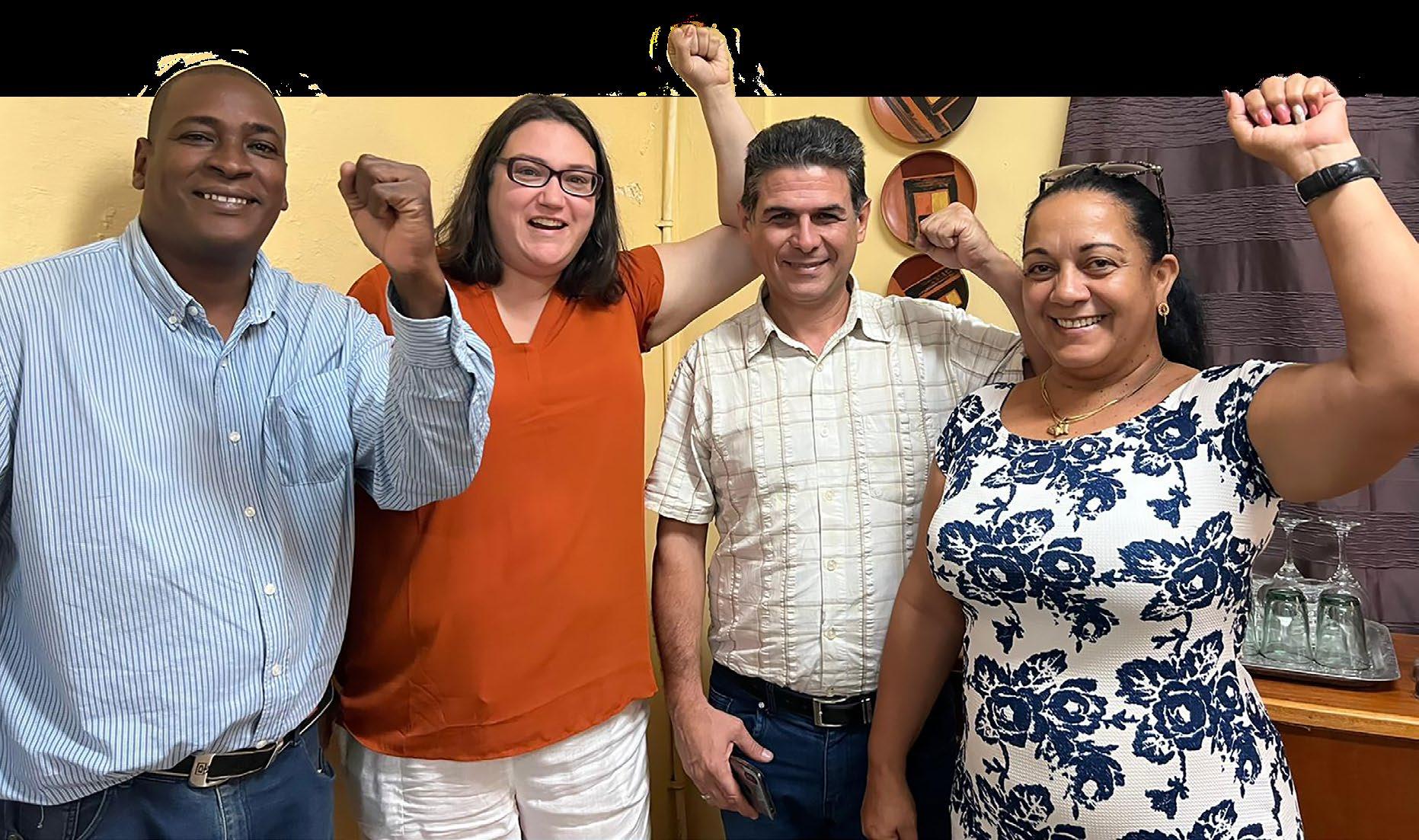
FOLLOW KAREN on Facebook and Instagram: @kranalletta
KAREN RANALLETTA, PRESIDENT
VIVA CUBA! During an October visit to Cuba to meet with partner unions, CUPE BC President Karen Ranalletta took time out with (from left) Yaisel Osvaldo Pieter Terry, Secretary General of the National Union of Public Administration Workers (SNTAP); Alfredo Vázquez Pérez, Havana Secretary General for the Workers’ Central Union of Cuba; and Arisleidys Hidalgo Leyva, Secretary General of the Provincial Union of Public Administration Workers – Havana Province.
Campus custodians deserve better
CUPE members at two B.C. universities have launched campaigns for fairer treatment of campus custodians, advocating for these crucial services to be brought in-house.
Just before students returned to University of Northern British Columbia campuses in the fall, CUPE 3799 launched its A Better UNBC – for Everyone campaign to end contracting out of custodial services.
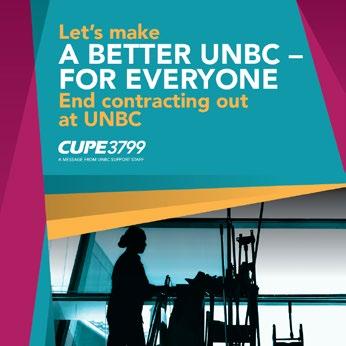

SHARING OUR MESSAGE
CUPE 3799 launched the A Better UNBC – for Everyone campaign with a campus BBQ. Dawn Zemoura, left, and Tamara Sweet are member organizers for the campaign.

The campaign kicked off with a well-attended BBQ in August. In November, the message went out to the community with billboards and an online petition encouraging supporters to visit aBetterUNBC.ca and call for an end to contracting out at UNBC.
This campaign matches similar efforts by CUPE 3338 at Simon Fraser University. Campus support workers have been campaigning for over a year to bring that university’s custodial staff in-house, too.
The SFU campaign is making a difference. In July, the university committed to becoming a living wage employer. While it’s welcome news, SFU refused to bring these services in-house. But CUPE 3338 members are undeterred. “Every step forward to fair wages and better working conditions is good, but campus workers deserve better,” said CUPE 3338 President Fiona Brady, in a statement following the SFU announcement.
HIGH VISIBILITY CUPE 3799’s campaign billboard, found throughout Prince George.
Member Mobilization Works
Two thirds of labour-endorsed candidates successful in local government elections B.C.’s local government elections concluded on October 15 after record involvement by CUPE members in all corners of the province.
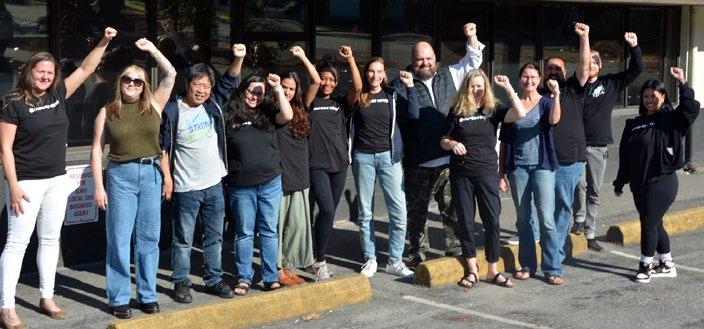
Led by a team of member organizers, CUPE activists participated in worksite visits, Zoom calls, presentations to locals, and direct member-to-member outreach. A total of 276 member-to-member calling shifts reached out to nearly 24,000 members in the Lower Mainland, on Vancouver Island and in the North.
Although several higher-profile campaigns did not return a progressive election result, the overall provincial outcome was positive. Two-thirds of the 282 CUPE and labour-endorsed candidates were successful, incumbents and new candidates alike.
“I’m incredibly proud of the engagement work by CUPE activists in this election,” said CUPE 403 President and member organizer Sarah Manchester.
“In the Township of Langley, City of Victoria, District of Saanich and many other communities, the work of CUPE members made a huge difference in the outcome, helping bring about a progressive result.”
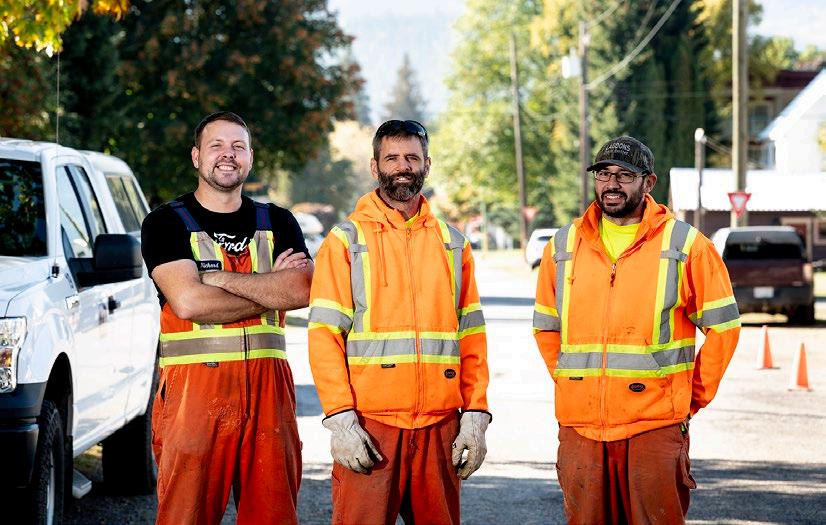
3 MEMBERS ON THE FRONT LINE
OUR MEMBERS, OUR STRENGTH Recent CUPE campaigns promoting municipal workers have included photo shoots for public awareness building in Revelstoke (CUPE 363 members, left) and a strike-averting campaign in Saanich (CUPE 2011 members).
ALL IN FOR PROGRESSIVE WINS CUPE BC’s campaign volunteers at the Maritime Labour Centre worked the phones calling fellow CUPE members to get out the vote for the October 15 municipal elections.
CUPE ACTION
VOICES
MEMBERS IN THE MEDIA

“Library workers provide a diverse array of vital services, supporting kids, seniors, families and our most vulnerable from twelve community branches across Greater Victoria. This new agreement will help address worker affordability challenges, and will result in improved services for residents.” — CUPE 410 President Fatima Ferreira, on a new collective agreement with the Greater Victoria Public Library that is retroactive to January 1, 2022 and continues to the end of 2024. The Mitchell Advocate, November 21, 2022.
“We really decided that we needed to ‘sound the alarm,’ to use our campaign slogan. We need to get more exposure to the public to really highlight how much of a crisis it is. Thirty per cent of our ambulances are parked with no paramedics to work. Thirty per cent of our paramedics are off with mental health and illness injuries.” — CUPE 873 (Ambulance Paramedics and Dispatchers of BC) President Troy Clifford, on the current state of ambulance services in B.C. CTV News, October 20, 2022.
“Some of these incidents that happen to our staff are very traumatic, and they need extra support for that. It really messes with your head sometimes, so whether it be doctors or psychologists or counselling, we need extra support. It all leads down to funding—and the lack of funding that’s provided to schools for our most vulnerable students.” — CUPE 728 President Tammy Murphy, noting that education assistants are victims in more than half the incidents of workplace violence in Surrey schools. CBC Radio, “On the Coast,” November 3.
“E-Comm answers over two million calls a year … it’s the nexus of emergency response in the province. It’s something that’s worth investing in.” — CUPE 8911 President Donald Grant urges E-Comm, municipalities, regional districts and the provincial government to sit down together and develop permanent solutions to B.C.’s emergency 9-1-1 response crisis. Global News, August 30, 2022.
“I couldn’t be more happy and excited for what we’re able to offer all these young people for these next two weeks and the amazing tradespeople and facilitators that have travelled so far to come here to help educate them and showcase their skills and their craft.” — CUPE 4990 (K-12 support staff) and CUPE BC Skilled Trades Committee member Lisa Scott, on the 16 female youth between the ages of 9-13 who participated in the first week of a discover trades camp by the BC Tradeswomen Society at the College of New Caledonia in Quesnel. Quesnel Cariboo Observer, August 9, 2022.
EXCELLENT
SERVICE For this year’s Premier’s Awards for Excellence in Education, the winner for education assistants was CUPE 801 member Elaine Tattrie, who has served as an EA on the Sunshine Coast for 20 years and with School District 46 even longer. Congratulating Elaine (left) at the Oct 14 ceremony were CUPE Education coordinators Kirsten Daub and Justin Schmid (second left, far right), CUPE BC President Karen Ranalletta, and CUPE 801 past secretary-treasurer Liana Leskie.
OMDC plans major campaign
The Okanagan Mainline District Council (OMDC), one of CUPE’s six nationally affiliated regional bodies in B.C., is planning for a Spring 2023 launch of a region-wide, multi-sector campaign about the importance of CUPE work and the public services our members deliver.
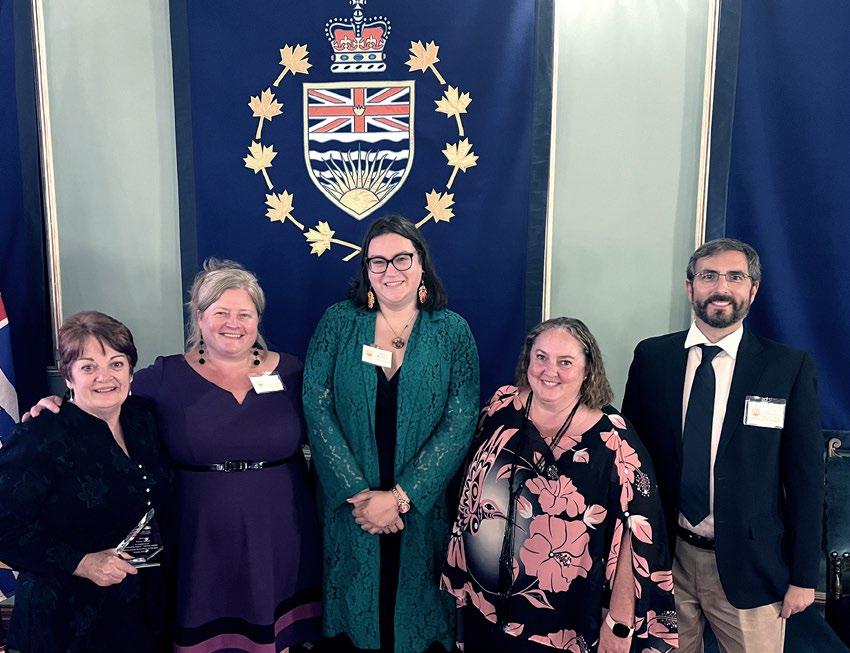
The campaign, supported by CUPE through a cost share, will include region-wide advertising on billboards and radio, sponsored community events, promotional assets for locals, and—before the launch—a rebranded OMDC.
The OMDC region covers some of the province’s fastest growing communities. Its two largest cities, Kamloops and Kelowna, are among the ten fastest growing communities in the country, each surpassing 10 per cent growth between 2016 and 2021. This rapid growth has led to housing and labour shortages, inflationary pressures, gentrification and sprawl, and major impacts on the region’s rural, farming communities. High on the list of concerns is that many new and existing residents are unaware of the importance of the public services and public workers that support the region’s population.
“We took inspiration from the 2018-19 campaign run by our municipal locals, which was effective and widely recognized,” said Acting OMDC President Charlene Turnbull. “A multi-sector regional campaign makes the best use of our resources, promotes cooperation across sectors, and has real impact in communities across our region.”
The Okanagan Mainline District Council is composed of eighteen locals from the central and southern Interior whose members work primarily in the municipal, K-12, library, community social service and post-secondary sectors.
4 CUPE ACTION MEMBERS ON THE FRONT LINE
CUPE
Eby takes helm of BCNDP, province
VICTORIA | Vancouver-Point Grey MLA and Attorney-General David Eby was sworn in as B.C.’s new premier on November 18, shortly after taking the helm as BCNDP leader following John Horgan’s decision to step down from both positions after eight years as party leader and five as premier.
CUPE BC had endorsed Eby as the new BCNDP leader, citing his long commitment to justice, equality and fairness, and his capacity to take swift action on key issues facing working people.
“David Eby is a proven leader with a strong record of successfully tackling difficult challenges,” said CUPE BC President Karen Ranalletta. “He is also the best person to take on, and defeat, Kevin Falcon and the BC Liberals/BC United, whose anti-worker, privatization agenda will dismantle all the progress made over the past five years to strengthen our public services, education and communities.”
Premier Eby hit the ground running, introducing several measures on crime, inflation and housing shortly after being sworn in.
CUPE locals to the public: Try transit!
While ridership numbers increased with the gradual easing of COVID-related restrictions—Translink was at 73 per cent of pre-pandemic levels—a truly sustainable transit system operates with much higher passenger volumes, said the two CUPE local presidents.
BURNABY | Citing higher fuel prices and cost of living, increasing traffic and commuting challenges, as well as concerns about climate change, two CUPE locals representing transit workers in the Lower Mainland and Capital Region launched a late summer campaign urging the public to “Try Transit!”
“Metro Vancouver and Victoria have excellent infrastructure for public transit, and systems everyone can use—we just need more people to use them,” said CUPE 7000 President Tony Rebelo, whose local represents 950 SkyTrain workers.
“Our public transit system is a more affordable option than driving— especially for students, seniors, people with mobility issues and those on low or fixed incomes,” said CUPE 4500 President Chris Gindhu, who represents 194 members working for the Coast Mountain Bus Company in the Lower Mainland and 29 BC Transit workers in the Capital Regional District.
The campaign featured transit shelter ads in the Victoria area, billboards in the Lower Mainland, social media advertising, and a campaign website, trytransit.ca
Martina Boyd named B.C.’s new Regional Director



Since the last regular issue of Public Employee, there’s been another change in CUPE’s leadership team for the B.C. region.
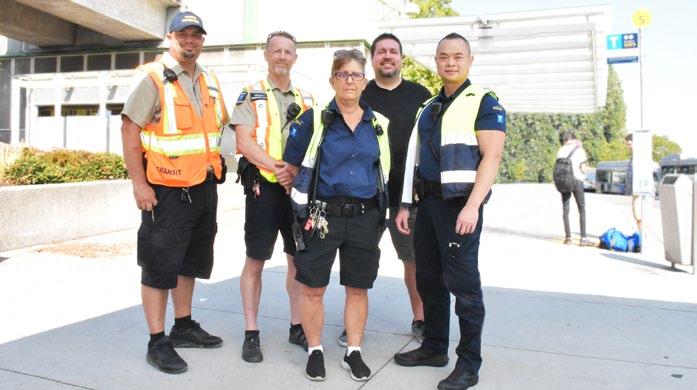
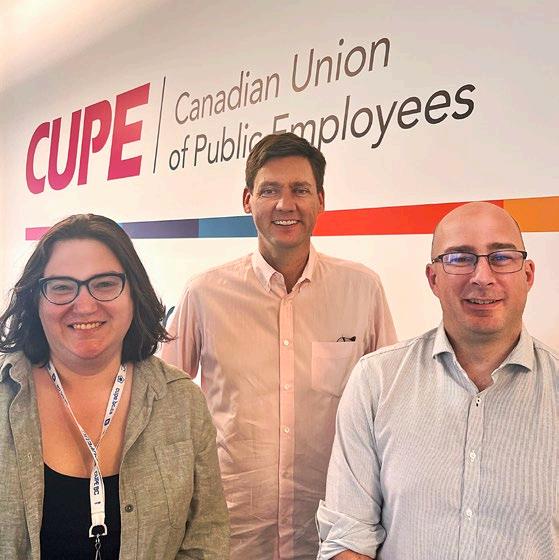
Martina Boyd, who had been serving as Legislative Coordinator after 13 years as a CUPE Legal Representative, was appointed as the union’s new Regional Director for British Columbia in June. She replaces Temporary Regional Director Ann Lennarson, who has returned to Ontario.
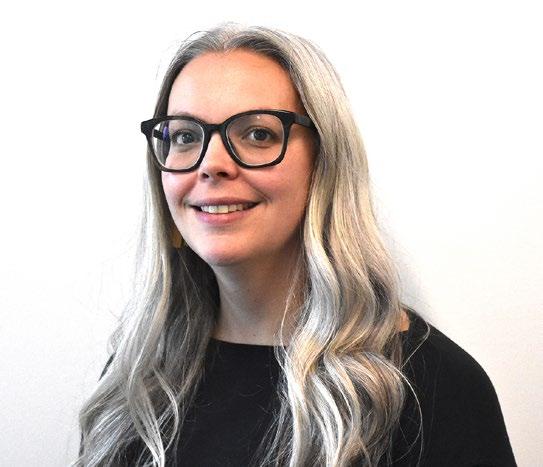
As Legal Representative, Martina represented CUPE members and locals on grievance arbitrations, human rights issues, and various Labour Board matters. As Legislative Coordinator, where she was responsible for coordinating provincial government relations for CUPE BC, she worked closely with the Division in securing such improvements as five days paid sick leave and single step (card check) certification.
CUPE BC Convention: Save the date!




Preparations are well underway for the 2023 CUPE BC convention, scheduled for April 26-29 at the Victoria Convention Centre. Convention resolutions are due by noon on February 27 and can be submitted to info@cupe.bc.ca.
All convention details and deadlines can be found in the Convention Call, available online at cupe.bc.ca. A key date is March 13, the deadline to submit a small local subsidy request, and a request for on-site childcare—a new service at CUPE BC conventions.



















MEMBERS ON THE FRONT LINE 5 CUPE ACTION
HAVING OUR BACK David Eby met with CUPE BC officers during a visit to CUPE’s regional office in Burnaby.
GREAT PARTICIPATION CUPE activists —forming the largest delegation to the 2022 BC Federation of Labour (BCFed) convention— gathered as a caucus to discuss issues and priorities, and to endorse candidates for the BC Fed executive.
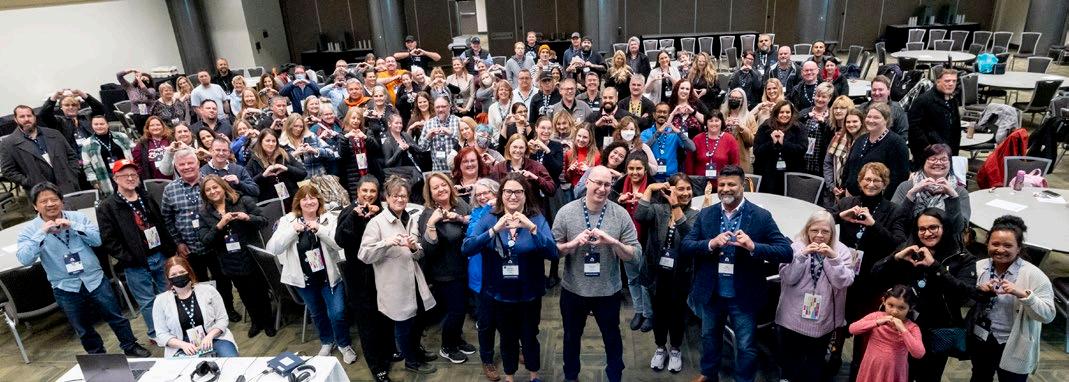
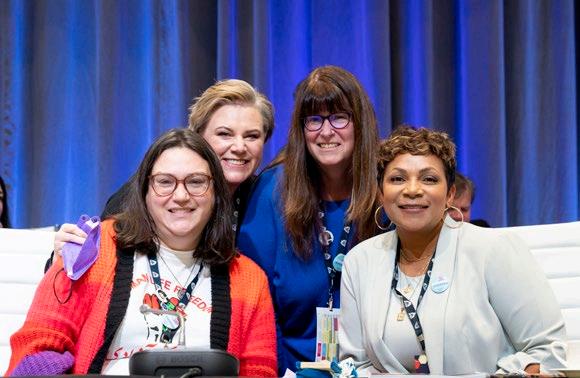
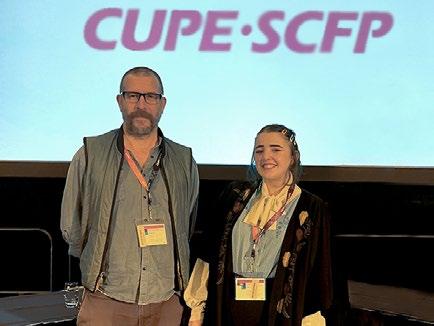
Right: CUPE BC President Karen Ranalletta
CUPE 1760
FIRST DEAL FOR UNITED WAY BC
BURNABY | CUPE 1760 and United Way British Columbia (UWBC) reached a collective agreement soon after CUPE BC’s annual convention – the first contract since United Way of the Lower Mainland amalgamated last year with five other United Way entities.
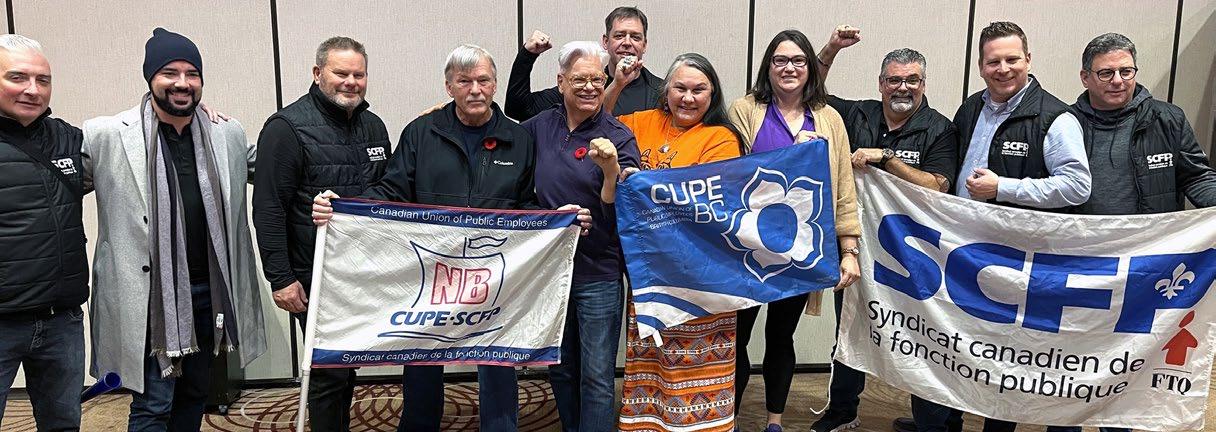
The four-and-a-half-year agreement includes two years of retroactive wage increases, recognition of the current cost of living, and several improvements important to the parties. These included improving fairness, diversity, equity, and inclusion terms in the collective agreement, and increasing benefits coverage for paramedical services that haven’t been adjusted in many years.
CUPE 1760 represents approximately 110 employees of United Way British Columbia working with communities in B.C.’s Interior, Lower Mainland, Central and Northern Vancouver Island.
from left, HEU President
UNION, BC ASSESSMENT REACH NEW AGREEMENT
VICTORIA | CUPE 1767 and BC Assessment signed off in the Fall on a new three-year contract, which will run retroactively from January 1, 2022 through December 31, 2024.
As well as wage increases, the deal features major benefit improvements including a minimum 100-per-cent increase to extended health benefits, the addition of corrective eye surgery coverage, and an increase to different premiums and allowances including parental leave. It also includes an expanded list of positions eligible for promotion and reclassification pay, several improvements to leave language, and the addition of new Indigenous articles.
The agreement covers approximately 600 members of CUPE 1767 who work as appraisers, assessment administrators and property information collectors, as well as in communications, finance, information technology and data services in 14 locations around the province, including head office in Victoria.
MAKING CONTACT
Members of CUPE’s national committees convened their first in-person conference in Vancouver, November 1-3. As well as stressing support for education workers in Ontario at the height of the legislative battle with the Ford government, delegates heard from CUPE 1004 (PHS Community Services Society) member Andy Healey and CUPE 1936 (WISH Drop-In Centre Society) member Juno Timleck about the toxic drug crisis, the fight for safe supply, and the challenges in Vancouver’s Downtown East Side community.
NEWS BRIEFS 6
CUPE 1767
joined,
Barb Nederpel, BCGEU President Stephanie Smith, and keynote speaker April Sims, President-elect of the Washington State Labour Council, who gave a powerful address about the massive organizing being led by young and racialized workers across the continent.
SOLID SUPPORT Karen Ranalletta and CUPE National Diversity Vice-President Debra Merrier (orange shirt), from B.C., and CUPE leaders from Quebec (right) and New Brunswick (left) join CUPE Ontario President Fred Hahn (centre) in supporting the 55,000 Ontario CUPE education workers the Doug Ford government tried to legislate back to work in early November. After mass rallies, CUPE and Labour solidarity forced the premier to withdraw the union-busting Bill 28.
Medicare vs Brian Day – the fight continues
AN ONGOING LEGAL BATTLE AGAINST A VANCOUVER-BASED PRIVATE HEALTH CARE CLINIC HAS SERIOUS IMPLICATIONS FOR ALL CANADIANS
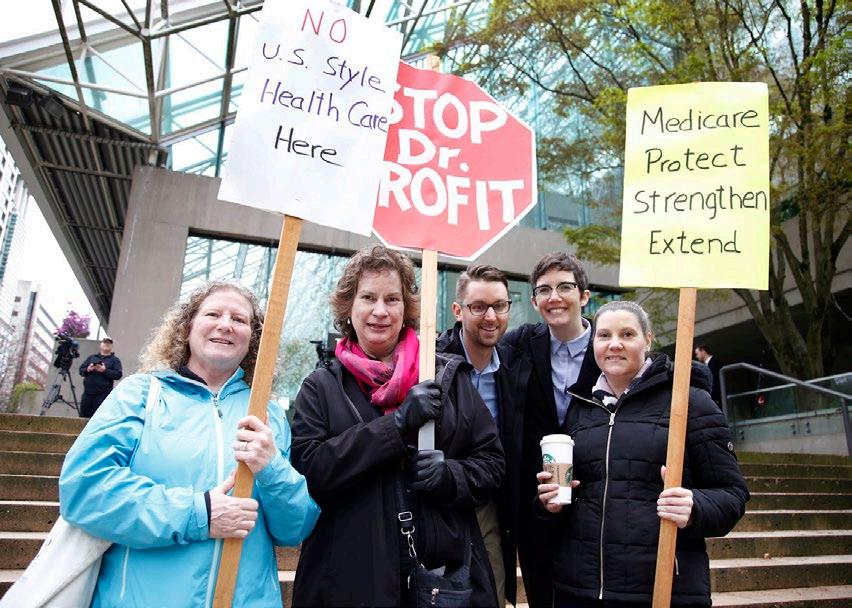 By Usman Mushtaq
By Usman Mushtaq
For over a decade, the BC Health Coalition (BCHC)—along with our friends at Canadian Doctors for Medicare—have been engaged in a constitutional challenge to protect public health care in the B.C. courts. At stake in the Cambie legal case is the objective of equitable access to health care that is based on need and not on ability to pay. Now, as the Cambie case heads to the Supreme Court of Canada, the stakes are even higher as public health care could be threatened nationally.
In 2009, Dr. Brian Day, the CEO of Cambie Surgeries Corporation—one of the largest for-profit clinics in Canada—launched this legal challenge against the public health care system after a government audit of Cambie was triggered by patients who were illegally billed. Cambie’s legal challenge aimed to strike down key provisions of the BC Medicare Protection Act that restricted extra-billing and the use of private insurance for medically necessary procedures.
HEALTH CARE FOR THE WEALTHY FEW
Cambie Surgeries, on behalf of its private investors, wants to bill both patients (or their private insurers) and the Medical Services Plan for the same procedure. They also want to charge patients higher fees than the public plan pays and allow patients to buy private insurance to cover those fees. If Day had been successful in the legal challenge, patients who could afford to pay would be able to jump the line in
accessing health care, leaving the majority of us with longer wait times.
The good news is that Day has not been successful so far. The BC Supreme Court ruled against Day and Cambie Surgeries in 2020, citing evidence presented by the BCHC and our partners that showed private, for-profit health care drains resources from the public system and leaves the majority of us with longer wait times.
In fact, Justice Steeves of the BC Supreme Court, who wrote the landmark 880-page decision, repeatedly made the point in his decision that a duplicative private health care system would only degrade care for most people – leading to longer wait times, higher costs for worse care, and a system tilted in favour of the wealthy who could pay for their care.
The BC Supreme Court decision was immediately appealed by Day and Cambie Surgeries. But the BC Court of Appeal ruled against Day and Cambie Surgeries this year. The Court found that the key provisions in the BC Medicare Protection Act challenged by Day, which prohibit extra billing and duplicative private insurance for medically necessary procedures, are “premised on the principle of equity such that patients are prioritized based on medical need and not ability to pay.” The Court also agreed with the 2020 BC Supreme Court decision on the harms of striking down these key provisions.
RESISTING U.S.-STYLE HEALTH CARE
The fight is not over yet. Day and Cambie Surgeries have filed with the Supreme Court of Canada. The case is most likely headed to Ottawa where it will have national implications for our public health care system. If Day and Cambie Surgeries are successful, we could see a U.S.-style health care system in Canada where (among other changes) workers would have to pay for basic health care through private insurance. Instead, we need to be promoting and expanding existing public solutions that are efficient, evidence-based, and proven to reduce wait times while improving the quality of care in an equitable way.
The BC Health Coalition has valued the support of CUPE members who’ve contributed to our Legal Defense Fund and the fight in the courts. We still need your help and voice. Stay tuned for more updates at savemedicare.ca.
Usman Mushtaq is coordinator of the BC Health Coalition.

CUPE FOCUS 7 CAMBIE CLINIC CASE
GUEST COLUMN
“If Day and Cambie Surgeries are successful, we could see a U.S.style health care system in Canada.”
CUPE 2278 launches historic organizing drive at UBC
Campaign addresses unfair compensation and unequal working conditions for student workers
VANCOUVER Student workers have launched the largest organizing drive in recent B.C. history, their campaign at the University of British Columbia (UBC) getting underway as students were returning to campus for the fall semester.
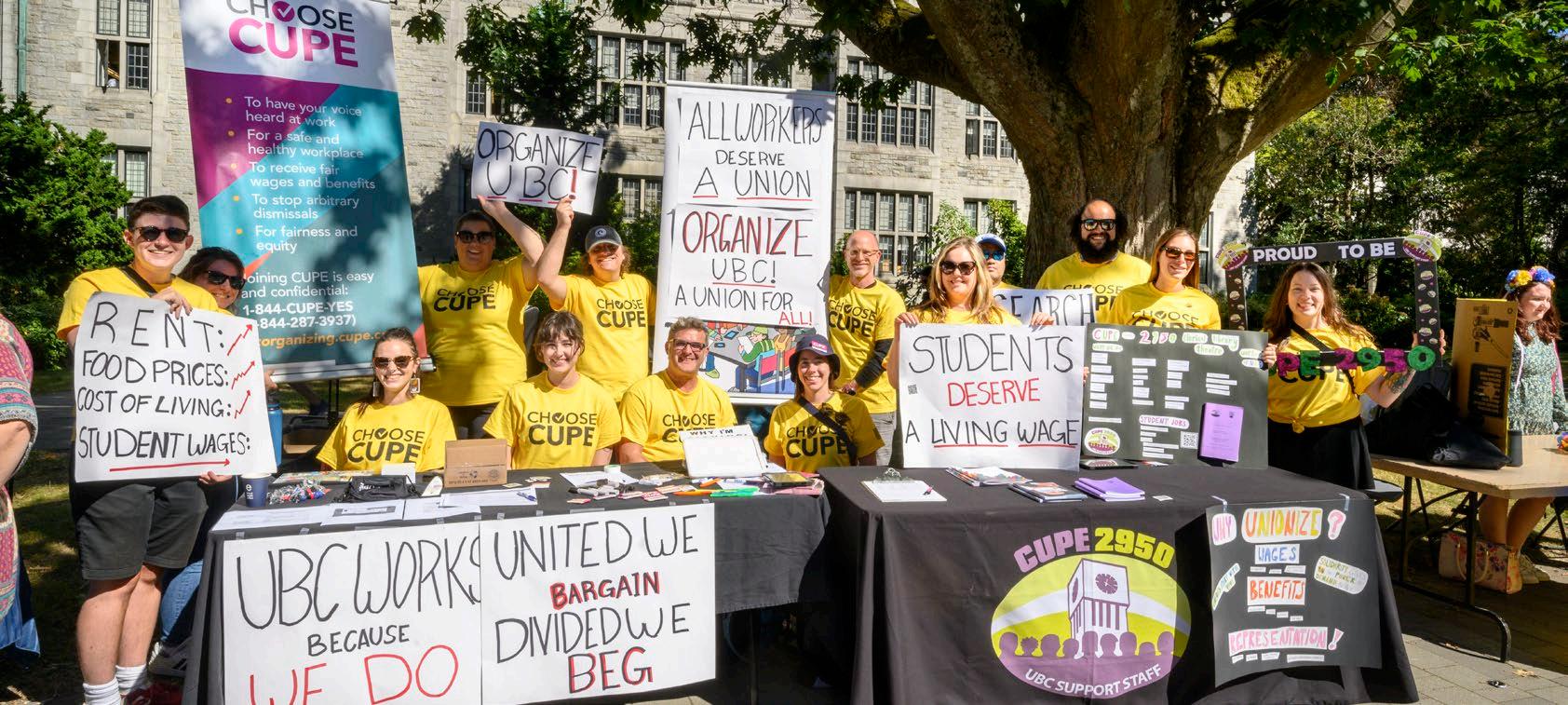
“For far too long academic assistants, research assistants and Work Learn employees haven’t been fairly compensated and have had unequal working conditions,” says CUPE 2278 President Phyllis Pearson, a member of the Committee to Organize UBC.
“Right now, the reality is that the burden is on students to negotiate directly with their supervisor, and we’re working to change that. All student workers deserve a work environment free of harassment, with clear job expectations and access to a dispute resolution process.”
“All student workers deserve a work environment free of harassment, with clear job expectations and access to a dispute resolution process.”
The organizing committee is made up of diverse voices from students across campus who want to improve working conditions for student workers.
“Over the fall semester, our campaign has spread across the campus and the feedback from students has been overwhelmingly positive,” adds Pearson. “We’ve really laid the foundation to organize student workers, and we will be ramping up our organizing efforts in January.”
Pearson encourages students who want to get involved in the campaign to reach out to the organizing committee by e-mail at organizeubc@gmail.com, or on Instagram at @cupe2278 For more information on the campaign, visit: organizeubc.cupe.ca
While the organizing drive for UBC academic workers is ongoing, CUPE welcomed exam invigilators at UBC’s Centre for Accessibility this fall after a successful three-week organizing drive. Predominantly graduate students themselves, this group of workers administers exams for students who require accommodations. These newest CUPE members will join CUPE 2278, one of three CUPE locals at B.C.’s largest university.
CUPE Grows Across B.C.
CUPE has recently welcomed the following members:
Summerland Community Support Workers (CUPE 523)
Summerland Community Support is a community organization offering programs and supporting local residents living with developmental disabilities. The organization’s workers provide a diverse range of services, including recreation programs, arts and crafts classes, nutrition and fitness programs, and life skills.
Fraser River Indigenous Society Workers (CUPE 1936)
These new members provide family development, early years learning and housing support for Indigenous Peoples, primarily in the communities of Maple Ridge and Pitt Meadows.
Organized Crime Agency of BC –Civilian Support Staff (CUPE 718)
Specialized professionals who deliver operational and administrative support to the Combined Forces Special Enforcement Unit of British Columbia (CFSEU-BC)
MAKING THE CASE CUPE member organizers and regional staff took their organizing drive directly to students at UBC’s Point Grey campus in the Fall.
CUPE FOCUS 8 UNION GROWTH
“¡Hasta la Victoria Siempre!”
How our relationships with Cuban partners are making a difference
HAVANA | “Ever onwards to victory!” That’s how CUPE BC and our public sector labour partner in Cuba, SNTAP (National Union of Public Administration Workers), have approached our 27-year partnership of worker-to-worker projects that have proven inspirational and beneficial for both partners. The solidarity built through this relationship has been all the more gratifying given the ongoing impacts of the U.S. embargo on Cuba—at more than 60 years, the longestlasting regime of sanctions in history.
A punishing embargo
The U.S. blockade deprives Cubans of access to essential medicines and medical equipment, basic school and office supplies, like paper, computers, and automotive equipment. After a thaw in relations under Barack Obama, Donald Trump in 2017 imposed more than 240 additional restrictive measures on Cuba, which Joe Biden has upheld to date.
The blockade’s effects reach beyond Cuba and the U.S. In Canada—which at the United Nations has voted every year since 1994 to end the blockade—people and businesses have also been adversely impacted. Since 2020, people in Canada have been barred from sending remittances to family and friends in Cuba through Western Union and from using PayPal or GoFundMe for Cubanrelated charitable purposes or familial aid. Canadian businesses have had transactions blocked due to the Cuban origins of their goods, and the U.S. has even fined Canadian subsidiaries for conducting regular business with the Cuban Embassy.
Despite these restrictions, Canadian trade unions and civil society organizations have been able to foster decadeslong partnerships through different
sectors— health, education, and public administration —with Cuban labour organizations. In doing so, they circumvent a punitive and ideologically motivated U.S. trade policy to provide much-needed material goods to Cubans.
Breaking the blockade
Since 1995, CUPE and its B.C. Division have been partner organizations to SNTAP and its provincial division of Havana, SPTAPH. In 2020, SNTAP began a four-year project aiming to provide workplace health and safety advocacy training for shop stewards from Havana’s municipal workers. They also sought assistance from partners to help overcome the effects of the U.S. trade embargo through shipments of critical supplies the union needs to represent its members effectively.
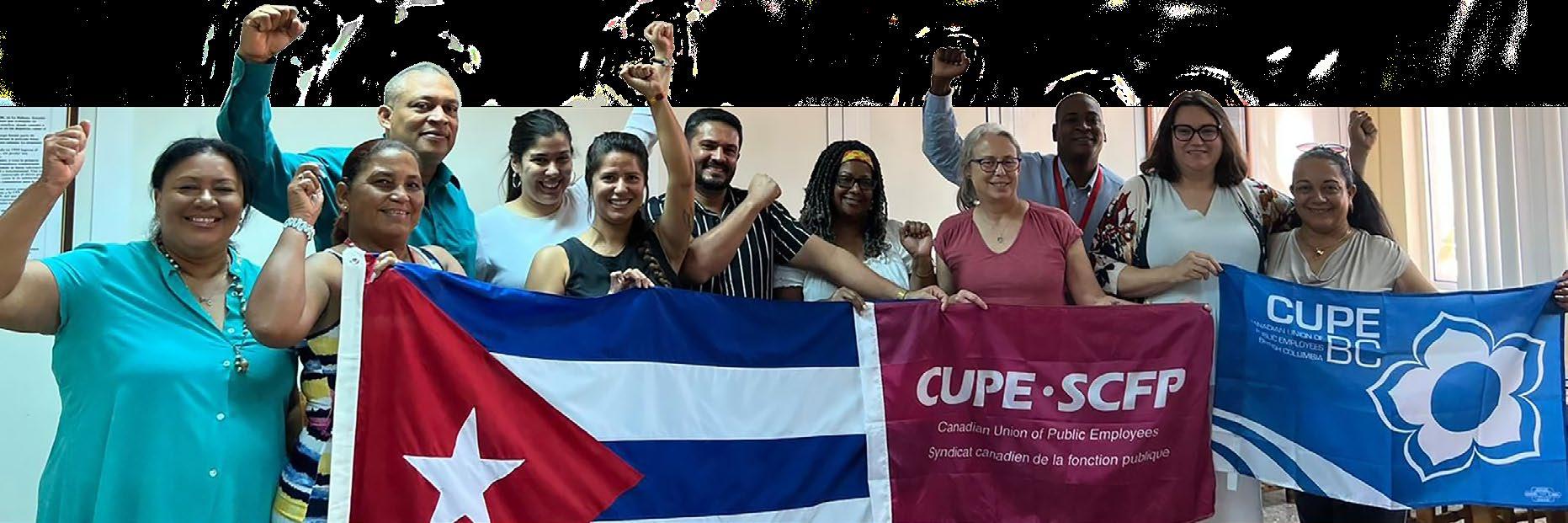
CUPE BC’s part of the project with SNTAP has three components: a “Solidarity Container” for the shipment of urgentlyneeded automotive, electronic, and medical supplies; learning exchanges through CUPE delegations to Cuba and SPTAPH-SNTAP delegations to Canada; and training programs in stewarding and occupational health and safety for SPTAPH members.
SPTAPH’s three computers, two printers and toner, and even its few pieces of office furniture have been supplied by CUPE over the years. But our Cuban partners are most excited about the vehicles recently shipped to Cuba aboard the CUPE and CUPE BC Solidarity Container. Before this year, SNTAP had only a single aging vehicle to service its 275,000 members across the country. Now, thanks to CUPE and CUPE BC, SNTAP has doubled its fleet with a newer used car. SPTAPH, the largest provincial union within SNTAP, now finally has a vehicle to service
By Deanna Fasciani
its 46,000 members. And, thanks to the partnership, SPTAPH’s Secretary General, Arisleidys Hidalgo Leyva, will finally learn how to drive!
Seeing the results
In October 2022, a delegation that included CUPE members and staff, CoDevelopment Canada staff, and CUPE BC president Karen Ranalletta travelled to Cuba’s capital city for a week-long visit with SNTAP’s leadership, local presidents of the Havana province division (SPTAPH), and leaders of the Workers’ Central Union of Cuba (CTC).
Our delegation visited SPTAPH worksites as well as a training centre that CUPE supports, named after beloved revolutionary leader Celia Sánchez Manduley. Meeting with workers, and learning about the issues they face in the workplace, we exchanged information and experiences about the union structures and labour relations models in our respective countries.
A major highlight for the delegation was meeting so many women and municipal workers, particularly outside workers in sanitation, in positions of leadership within their union. The Canadian visitors were humbled and inspired by the resilience, innovation, and commitment to the revolutionary process shown by our partners. Just as solidarity flows into Cuba, where it helps sustain struggle, solidarity from Cuba, a practice refined over the past many decades, is a source of strength and pride for CUPE members.
CUPE 1004 member Deanna Fasciani is executive director of CoDevelopment Canada and a member of CUPE BC’s International Solidarity committee.
9 CUPE FOCUS INTERNATIONAL SOLIDARITY
Bargaining for wins in challenging times
After two years spent fighting the COVID-19 pandemic and responding to the impacts of major climate events and other challenges, CUPE in 2022 turned our attention to bargaining new contracts for most of our 100,000 members in B.C.
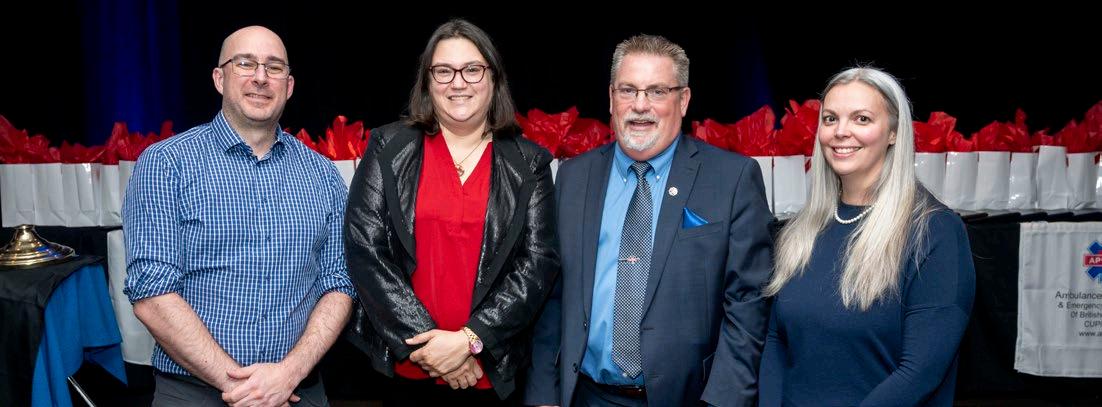
Entering this year’s round, we faced a difficult economic climate that has seen the cost of living skyrocket with the highest inflation rates in a generation. Negotiating collective agreements in such a climate is never easy, even with a worker-friendly provincial government in Victoria. But CUPE and other public sector unions have nonetheless made significant gains at the table. (See main feature, starting opposite.)
In addition to wage increases and benefit improvements, we’ve won standardized language across provincial agreements to provide cultural leave for Indigenous workers, better provisions for sick leave, and improvements for casual and precarious workers. In some cases, we’ve also addressed recruitment and retention challenges so endemic to our workplaces. This would not have been possible without a strong show of solidarity throughout the labour movement and, within CUPE, internal coordination through every step of the bargaining process.
Presenting a common front
Solidarity within the house of labour means working with other provincial sector unions whose members have faced similar challenges to those of our own members as frontline workers during the pandemic. We have all seen changes to our working conditions—for some of us, even to our jobs in general—throughout this period, and many of us are feeling the crunch of the higher
cost of living since 2020. With housing unaffordability an urgent issue for many, unions have a shared interest in making real gains and the strength in numbers to do it.
Solidarity means all public sector unions in B.C. having the same discussions with our provincial employers. In the context of bargaining, it means coordinating efforts to strengthen solidarity on the common issues we share across the province. Solidarity is especially important when it comes to wages and housing affordability. CUPE and other unions need only canvass our members to demonstrate that money doesn’t go as far as it once did: many of us are moving out of urban centres, where most jobs are located, because living in the city is no longer affordable.
Strategic bargaining is proactive
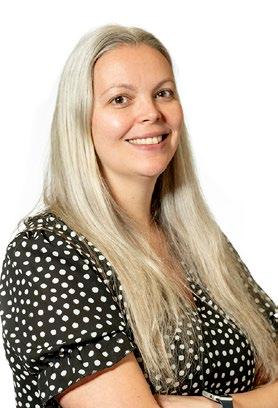
When we speak of coordinated bargaining in the context of CUPE internally, it starts with staff coordination within our sectors. Staff sector teams composed of B.C.’s servicing reps and their assigned specialists— communications, research, union education, legal, health and safety, job evaluation, and human rights— work with the directors to develop strategic bargaining plans specific to each local. By tackling the issues head on through coordination and communication, we arrive at the bargaining table better prepared to achieve the best possible deal for our members.
Make no mistake: these have been challenging times, and we are tackling difficult problems that do not have easy solutions. As well as the financial stresses around cost-of-living increases, there’s been an increasing focus on the health and safety implications of staffing shortages, hours of work, workload and working conditions, employee burnout and mental health supports. We’ll be facing the same pressures to find solutions in the new year, as bargaining continues for our larger locals in the municipal sector, which in Metro Vancouver comprise 20,000 members.
Despite uncertain times and constantly evolving circumstances, CUPE staff in B.C. have demonstrated real leadership and support for our members in bringing their knowledge and expertise to bargaining. Not everything we achieve is won at the table—for example, alongside K-12 negotiations we secured increased Ministry of Education funding to support additional hours for education assistants—but every win strengthens our position for the next round.
Organizing the unorganized
Times like these provide lots of opportunities to engage in important issues in the fight for strong public services. The challenges we face allow us to continue building solidarity while promoting the advocacy work of our union. Given the climate we’re in, forming a union has become more important than ever, and more unorganized workers can hear our voices and see what we’re doing—which is only inspiring more of them to join us.
10 MARTINA BOYD REGIONAL DIRECTOR LINKING LABOUR
“Not everything we achieve is won at the table… but every win strengthens our position for the next round.”
SUPPORTING FIRST RESPONDERS Martina Boyd joins Trevor Davies, Karen Ranalletta, and CUPE 873 President Troy Clifford at the Ambulance Paramedics of BC’s annual convention in October.
Building for a better future
ACROSS EVERY SECTOR, THE POST-PANDEMIC RECOVERY HAS ADDED HIGH INFLATION TO THE MANY CHALLENGES OF BARGAINING NEW CONTRACTS
BURNABY | Despite putting the darkest period of the COVID-19 pandemic behind us, 2022 has brought its own unique challenges to CUPE members’ lives. The rising cost of essentials for families, record high inflation and high interest rates have contributed to a growing affordability crisis, making this a tough year for many British Columbians.
According to recent data from livingwageforfamilies.ca, Victoria’s living wage—at $24.29 an hour—for the first time is higher than Metro Vancouver’s because of the increased cost of food on Vancouver Island. In Metro Vancouver the living wage has risen to $24.08 an hour, up from $20.52 in 2021. The living wage is the hourly wage that two parents working full-time need to earn to support a family of four. Across the province the living wage has increased in every community where it has been calculated.
The current economic climate has driven CUPE to adjust bargaining priorities and strategies to ensure that new collective agreements address the financial pressure members are facing, consider the mental health and well-being of members, and provide better supports during this challenging time.
Municipal bargaining
Municipal sector bargaining continues across the province as the realities of a challenging economic climate put increased pressure on CUPE locals.
In the Spring, CUPE 118 workers in the District of Tofino avoided job action after taking a strike vote to secure a contract that could support families and visitors in Tofino while also ensuring the District could recruit and retain staff.
More recently, four locals in the Greater Victoria area (CUPE 50, 374, 1978 and 2011) faced a tough round of negotiations while general inflation peaked.
Municipal workers in the District of Saanich (CUPE 2011) and the Capital Regional District (CUPE 1978) took strike votes to push back and tell employers that their members needed key issues to be addressed. Both locals were looking to make improvements to scheduling that would benefit workers and their ability to take care of their families while ensuring that vital services could still be delivered efficiently.
A strike aversion campaign in the region reached out to the public for support through transit, digital, radio and print advertising. Ultimately both locals were able to secure new collective agreements without strike action and successfully negotiated agreements that addressed members’ key concerns.
Municipal locals in Metro Vancouver and the Fraser Valley are currently preparing for upcoming negotiations, and several locals will be working on pre-bargaining campaigns to educate the public about the services CUPE members provide and the value they bring to communities.
If your local is interested in taking on a campaign in your community, we encourage you to get in touch with your CUPE Servicing Representative who can put you in touch with your CUPE Communications Representative.
Fighting for fairness
For more than a decade, CUPE 798 members who work at the Powell River Regional Library have been fighting for wage fairness and seeking the implementation of a job evaluation plan to ensure equal pay for equal work.
According to CUPE 798 President Fred Stutt, workers at the library have long been paid less than their colleagues at the City of Powell River who perform equivalent work with comparable complexity, responsibility, education, and skill requirements.
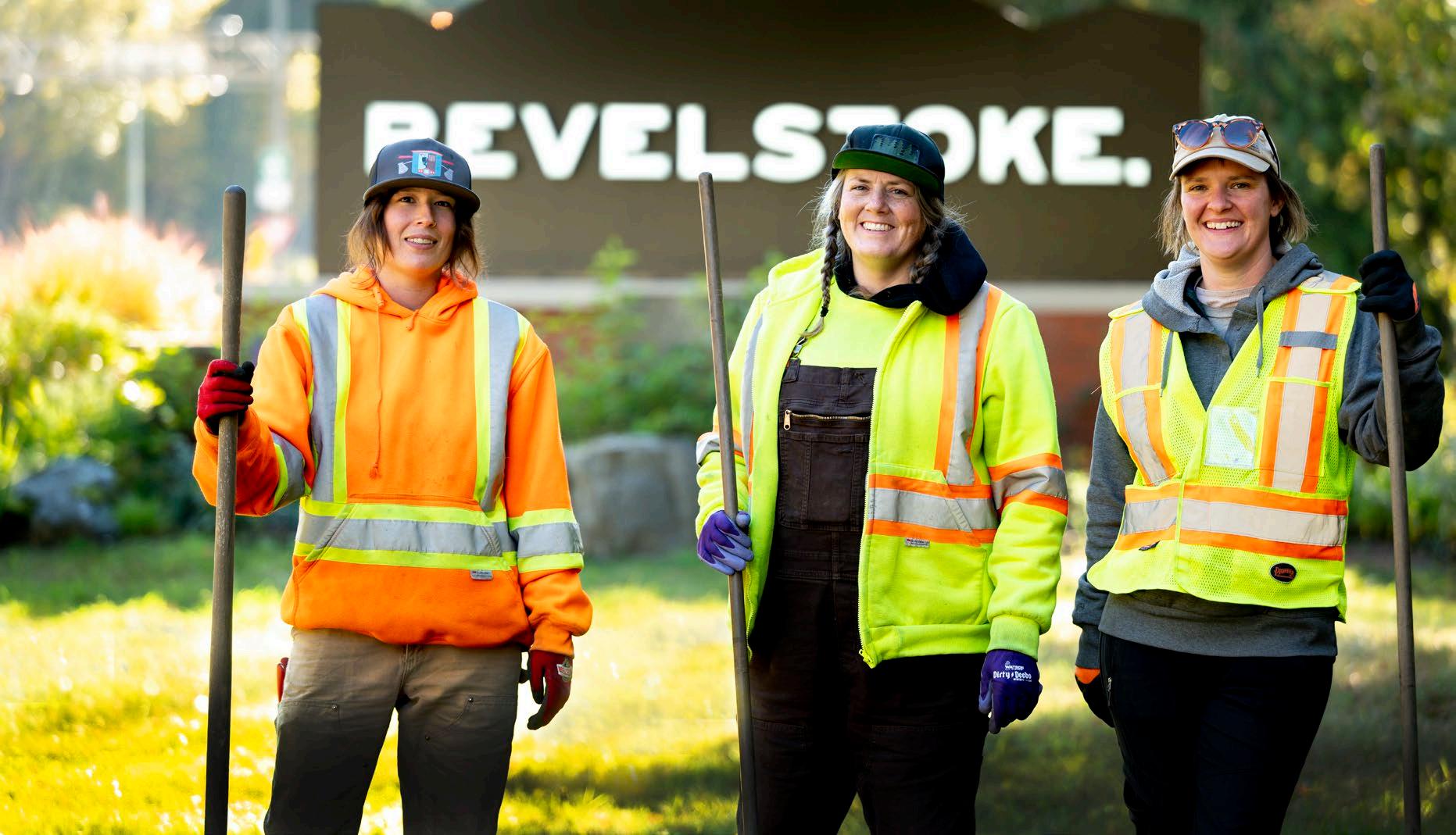
11
In the last several rounds of bargaining the local had prioritized addressing this long-standing issue but hadn’t been able to make significant progress.
In their most recent round of negotiations, CUPE 798 members decided that they could no longer wait for a job evaluation program. When the employer wasn’t willing to discuss this, the local made a difficult decision to take a strike vote. One hundred per cent of the membership came out to vote, and the result was a unanimous vote in favour of strike action.
“Nobody wants to go on strike, especially when you know how important the services you provide are in the community,” says Stutt. “The fact that every single Library member participated in the strike vote was a show of solidarity and support for the work of our bargaining committee on this issue.”
Through a difficult round of mediated discussions, the local was able to work with the Library and—with some genuine compromise—successfully address the issue of wage fairness. A job evaluation plan, similar to the one already in place at the City of Powell River, will be implemented at the Powell River Public Library. The plan will also include a review process, to make sure that current and future workers continue to be paid fairly for their work.
A provincial deal for K-12 support workers
Not long after students returned to B.C. classrooms in September, K-12 locals in B.C. reached a renewed Provincial Framework Agreement (PFA) at the bargaining table. The provincial deal covers more than 40,000 school support workers represented by CUPE and other public sector unions.
“Working together, we were able to reach an agreement that
recognizes the vital role our members have in providing this province’s students with the highest quality of education in healthy schools,” said Paul Simpson, president of the K-12 Presidents Council, thanking his fellow K-12 provincial bargaining committee members for their work reaching the three-year deal.
Bargaining to renew the PFA began in February 2022 – the same month of the throne speech that committed the B.C. government to “leave no worker behind.” Employer monetary offers at the K-12 and other provincial public sector bargaining tables, however, fell short, failing to account for the rapid rise in the cost of living.
Over the course of the Spring and Summer, CUPE worked with other B.C. unions in presenting a united front with a clear message to employers: they had to do better. This included several jointunion ads, which ran in newspapers across the province.
By the fall, the message was received. Thanks to a united voice from the labour movement, the K-12 Presidents Council was able to endorse a renewed PFA that included wage increases and costof-living adjustments that recognize the financial pressures facing school support workers.
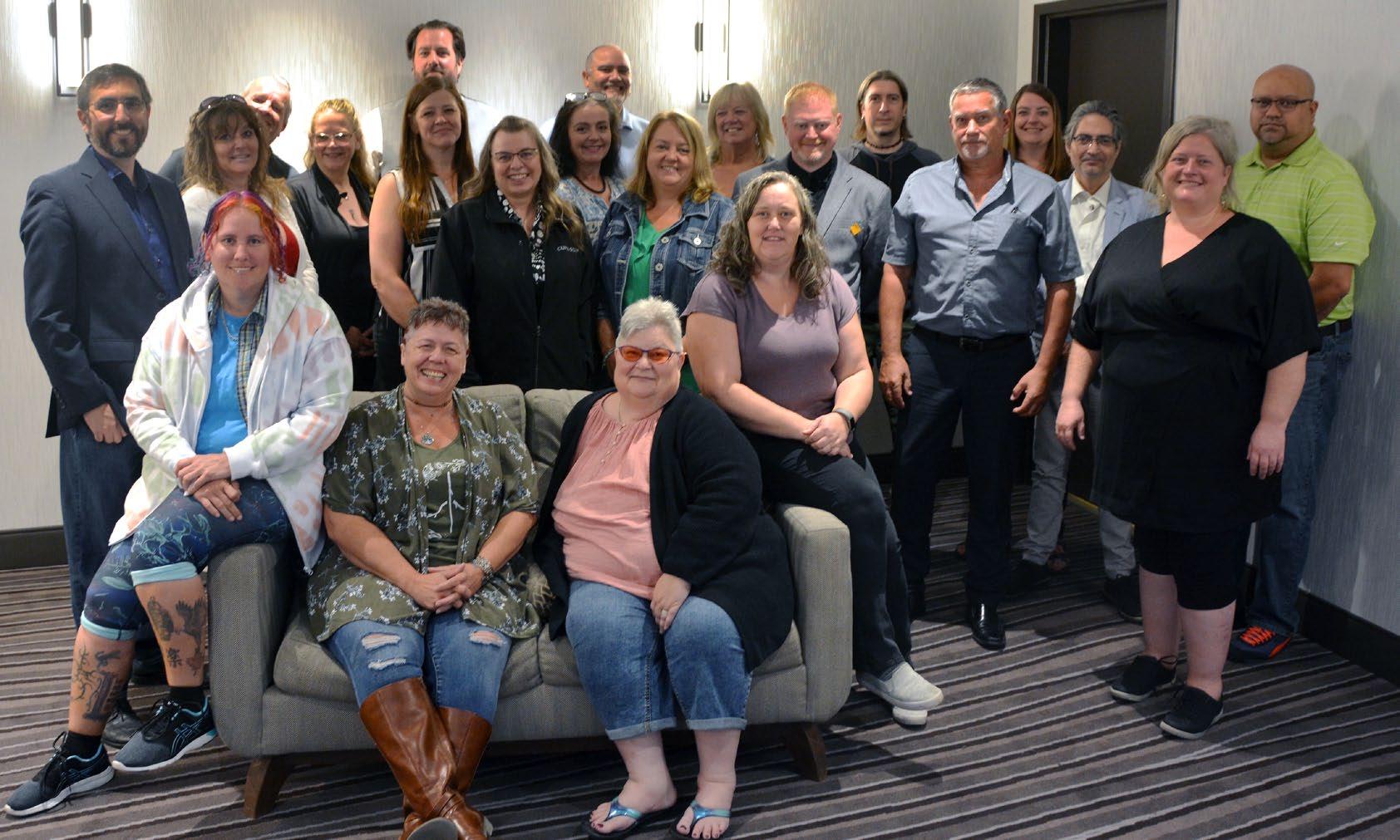
Other highlights of the K-12 PFA include increased provincial government funding for local bargaining to address local issues, a new Provincial Joint Health and Safety Taskforce with a mandate to support measures addressing workplace violence prevention, and $3 million in annual funding for potential benefit enhancements.
In addition to the PFA, the Ministry of Education will be increasing the Learning Improvement Fund. This will allow for more Education Assistant hours across the province.
The PFA now forms the provincial agreement portion of proposals that go forward in local bargaining between K-12 local unions and their respective school districts. Local bargaining has proceeded
12 CUPE FEATURE
STAYING STRONG CUPE’s provincial K-12 bargaining committee takes a break from negotiations.
for all CUPE K-12 locals, with the goal of having all tables wrapped up by the end of January.
College workers reach multi-employer deal
After three days of bargaining, proceeded by months of preparations, CUPE college support workers reached a tentative multi-employer agreement in mid-November. The three-year deal with B.C.’s Post-Secondary Employers’ Association covers approximately 2,100 CUPE members working at five B.C. post-secondary institutions.
“We are very pleased to reach an agreement that recognizes the crucial role CUPE members play on B.C. campuses,” said CUPE 4951 President Lily Bachand, whose CUPE local was one of the five involved in the multi-employer agreement. “We are confident this agreement will ensure our members can continue to provide the campus services that thousands of people depend on every day. This deal will ensure that they can continue to afford to live and prosper in the communities they serve.”

The tentative multi-employer agreement sets general wage increases and other financial provisions for five post-secondary institutions involved. This agreement will be incorporated into local collective agreements that will be negotiated to address institution-specific issues, with the hopes of concluding local bargaining in early 2023.
CUPE locals under the agreement are CUPE 1858 (Vancouver Island University), CUPE 2081 (Camosun College), CUPE 2773 (College of the Rockies), CUPE 3479 (North Island College), and CUPE 4951 (College of New Caledonia).
MULTI-UNION BARGAINING CONTINUES INTO NEW YEAR
As Public Employee went to press, multiunion bargaining associations representing CUPE members in other sectors were still at the table seeking new agreements. In the health sector, CUPE members working under the Health Science Professionals Bargaining Association collective agreement were attending information sessions through the first half of December about a tentative agreement (TA) reached in November. Members were set to vote on the TA between December 14 and 21, with results of the vote announced on December 22.
At press time, the bargaining committee for the Community Health Bargaining Association (CBA) had taken a pause from negotiations to meet with members and discuss the status of negotiations. “The committee looks forward to regrouping in January and discussing member priorities in order to determine next steps,” says CUPE CBA bargaining committee member Andy Healey.
The Nurse’s Bargaining Association commenced negotiations in late November. CUPE nurses met to discuss bargaining priorities which had been shared with the
other unions in the association. In the Community Social Services sector, the CSS Bargaining Association had taken a pause from negotiations—similar to that of the CBA in their negotiations—to meet with members and discuss next steps toward a new contract.
In the transportation sector, bargaining continued for CUPE 561 (First Transit) and CUPE 2087 (NextGen Transit Inc), while contract talks were set to begin in the New Year for CUPE locals 7000 (SkyTrain workers) and 4500 (Coast Mountain Bus Company workers).
CUPE FEATURE 13
BACK IN PERSON With COVID restrictions gradually lifting, CUPE members returned to more in-person meetings in 2022. Above and right, CUPE BC’s executive board members met in Harrison for the first summer think tank since 2019, with a guest appearance by CUPE Manitoba President Gina McKay (top right). Below, CUPE BC’s 21 committees assembled in November for the One Big Committee Meeting in Vancouver, opened by Elder Sam George (centre left) and featuring a guest presentation by CUPE 23 emeritus member, human rights lawyer and trans activist Adrienne Smith (bottom left).
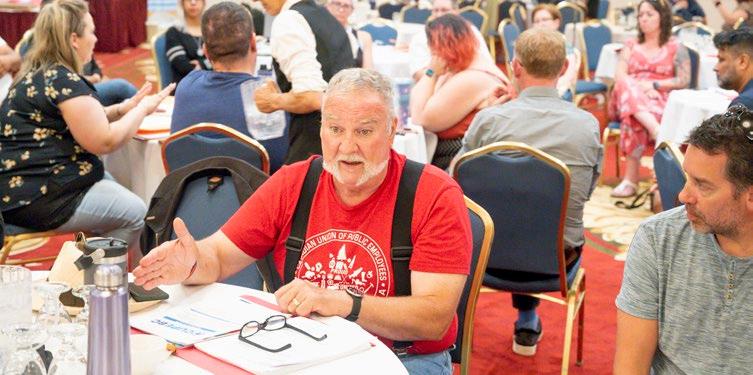
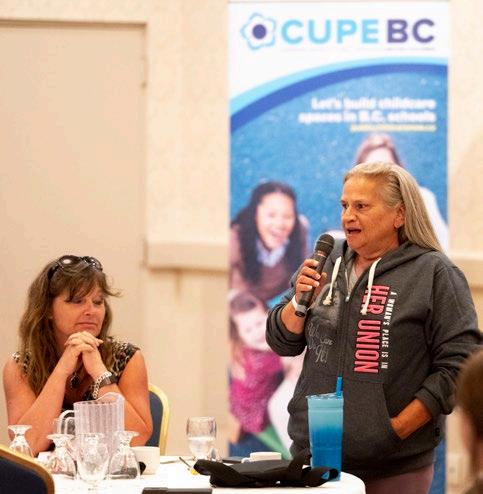

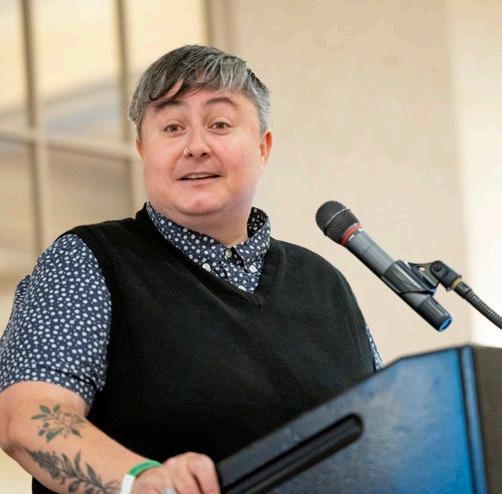
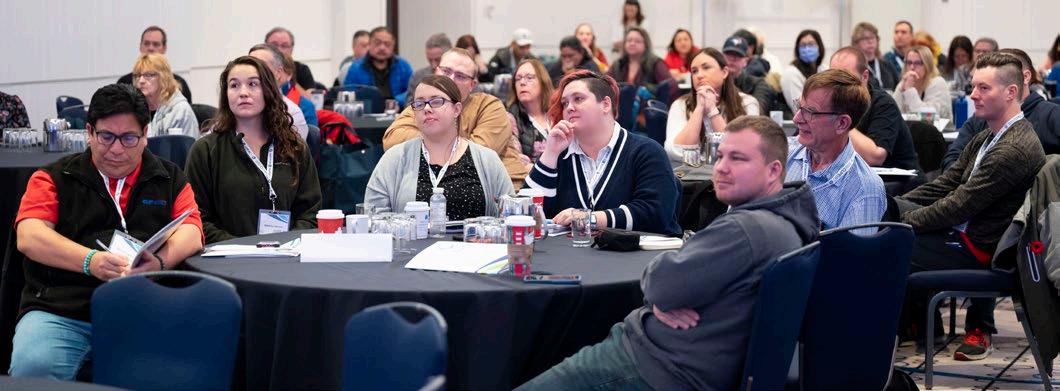
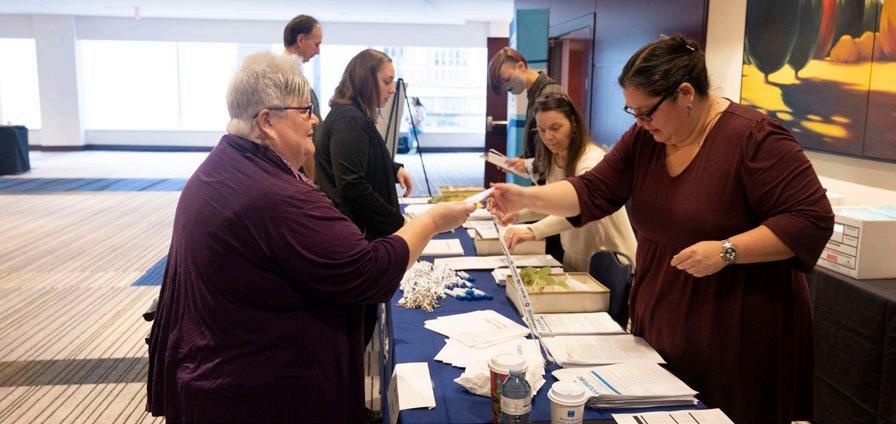
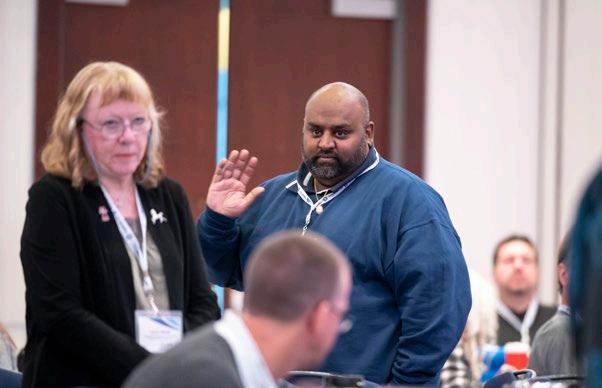

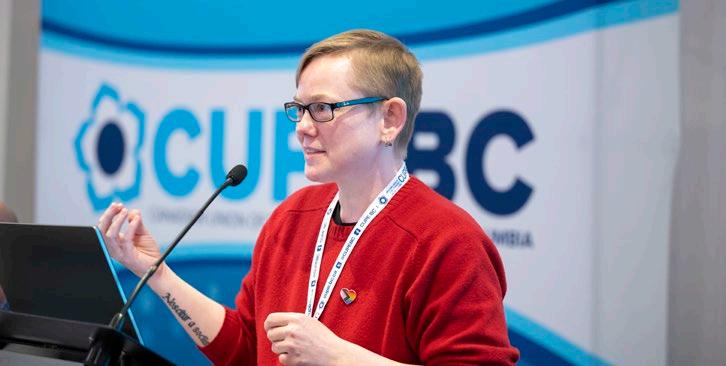
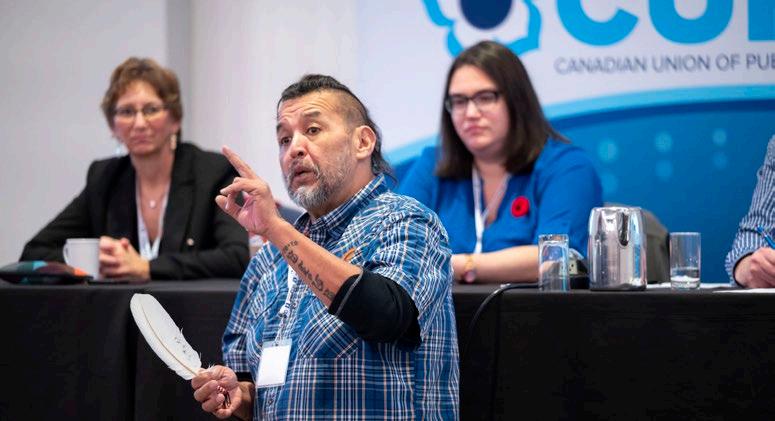
CUPE GALLERY 14
Taking it to the next level
After years of advocacy and activism, CUPE members bring their campaign for universal public childcare to decision-makers in Victoria
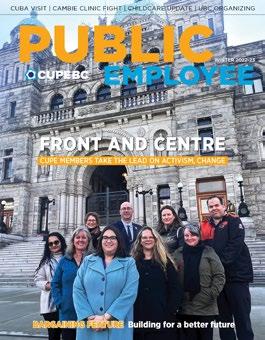
VICTORIA | They had repeated the same refrain for years at the local level, winning over fellow union members and other progressive activists. But now they had the ear of cabinet ministers, MLAs, and party caucus staff: British Columbia needs public childcare now.
This was the message CUPE activists took to dozens of decisionmakers from all parties during a dedicated lobby week in Victoria (November 14-17). Part of CUPE BC’s ongoing campaign to have before- and after-school care delivered directly by public workers in school districts, the week of meetings focused on key steps required to make universal public childcare a reality.
Direct member advocacy works
A unique element of lobby week this year was the high degree of member involvement. Each meeting included substantial input from members who could speak to their experiences—as education assistants, parents, or local leaders—supporting childcare in their school districts.
“The ability to tell our story directly to decision-makers was incredibly powerful,” says Valeria Mancilla, a CUPE 1936 early childhood educator, racialized worker and parent of two. “I think hearing directly from rank-and-file members brought our issues to life, providing examples of why public childcare is so important to parents, kids, families and communities.”
Member activism has been at the heart of the childcare campaign since its conception, with members’ stories of first-hand experience used for promotional videos, advertising and other materials to show what a system of public childcare would mean for workers and families alike.
More hours for education assistants
A key element of CUPE BC’s proposed system of public childcare is that it provides more hours for existing education assistants across the province. In every corner of B.C., one of the biggest barriers to creating more childcare spaces is a lack of childcare workers. Education assistants, highly qualified workers who struggle without sustainable hours of work, are in a unique position to provide the necessary staffing for a province-wide system of public before- and after-school care.
Amber Dolinski, a CUPE 723 member from School District 72 in Campbell River, shared her story with decision-makers as an example of how the current employment model for education assistants leaves workers in a constant state of financial crisis.
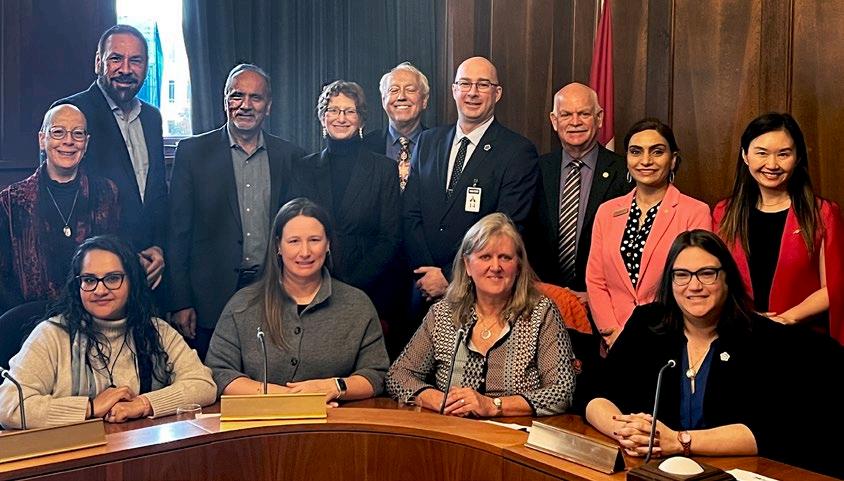
“A number of MLAs were shocked to hear how few hours EAs work and alarmed by the effects on our ability to earn a basic living,” she says. “At the same time, decision-makers were excited
by the potential of CUPE BC’s proposal to make life better for education assistants by creating much needed childcare spaces for British Columbians.”
Early campaign results showing promise
CUPE BC’s childcare campaign has begun to show results, with pilot projects in 24 school districts already providing school-age care for parents, and better childcare jobs for workers. Adam Clutchey, acting president of CUPE 5101, participated in lobby week to speak about the positive experiences in his district.
“The public childcare being run by my school district, staffed by our members, is a huge success for parents, students, workers, and our communities,” he says. “CUPE BC’s leadership on this campaign has made a huge difference for working people in my district, and I want to see this work continue until there is a universal system of public before- and after-school care in every community across our province.”
The CUPE BC plan is supported by the national union through a cost-share campaign, set to conclude at the end of 2022. Despite this timeline, plans to continue the campaign into the new year are well under way.
“This campaign has been life-changing for members—both those who struggle without fair wages and hours of work, and those who cannot find quality, affordable care for their kids,” says CUPE BC Secretary-Treasurer Trevor Davies, himself a parent of two kids who relies on childcare.
“The early success of this campaign is just the beginning,” he promises. “We will continue to put pressure on our provincial and local governments until we have the system of universal, public school-age care our communities need.”
ON THE COVER
CUPE childcare activists join elected officers and staff in Victoria to make their case for affordable, public, before- and afterschool care in B.C. schools.
15 CUPE FOCUS CHILDCARE LOBBYING
“The ability to tell our story directly to decision-makers was incredibly powerful.”
— Valeria Mancilla
From “Sisters” and “Brothers” to “Delegates” and “Friends”
HOW LANGUAGE HAS EVOLVED TO MAKE CUPE—AND ALL UNIONS—MORE INCLUSIVE
By the Pink Triangle Committee
For most of the past century, the traditional union greeting of “sister” or “brother” has been a familiar expression used in various contexts. Delegates at convention microphones, union leaders addressing union members with one of those sibling terms followed by their name, and speeches beginning with “Sisters and brothers,” are the obvious examples. But have you ever been called “sister” or “brother” at a union meeting and felt erased or misgendered because of it?
The labour movement practice of calling one another “sister” or “brother” clashes with a growing consciousness about the perils of classifying people using strict gender binaries. In recent years, more union activists have been reflecting on the use of these words and considering replacement terms to make their union more inclusive of trans and non-binary members.
Solidarity based on inclusivity
The union greeting of “sister” or “brother” was originally intended as a way for workers to instantly bond with one another based on their relationships as fellow union members. If you don’t know a person’s name and you’re walking a picket line together, the thinking goes, calling them “sister” or “brother” is a warm gesture—warmer, at least, than saying “Oh, hey.”
But there is no doubt that these terms are exclusive. Trans, nonbinary, and gender-fluid members who are fighting for visibility, rights, and space are erased and marginalized when a meeting chairperson has no way to acknowledge them at a microphone—or worse, misgenders them. This means that labour activists need to consider dropping the use of these terms entirely.
To move towards being a more inclusive union, the Pink Triangle Committee submitted a motion at the 2022 CUPE BC convention that delegates passed with unanimous support. The resolution encourages CUPE locals to: transition from using the term “brothers/sisters” to more gender-neutral terms including, but not limited to fellowworkers, siblings, kin, members, unionists, folks, friends or cousins.
Developing progressive language alternatives
Some unions have used the term “comrades,” which, while gender neutral, has a radical history and the connotation of particular socialist movements with which not all union members may feel comfortable.
Other unions use the term “fellow workers.” This is useful not just because it’s gender neutral, but also because “fellow worker” is a more obvious reflection of the relationships between workers.
As we have learned from our CUPE BC Indigenous Committee, people who are First Nations, Inuit or Metis often refer to each other as “cousins.”
As one CUPE member has put it: “When I hear a labour crowd addressed as ‘sisters and brothers’ I shudder, feeling unwelcome and erased. But when someone addresses a group with ‘sisters, brothers, and non-binary siblings’ or ‘sisters, brothers, and comrades’ I feel included and a little proud, because I know that someone took the time to work that out. They had a hard or awkward conversation, and they learned something about trans or non-binary people.”
CUPE BC’s Pink Triangle committee hopes members will have this discussion and come up with a term that works best for their local or district council.
DID YOU KNOW? Gender neutral terms are an important part of contract language ensuring trans inclusion and gender diversity in the workplace. For more information, see CUPE’s Bargaining Beyond the Binary document.
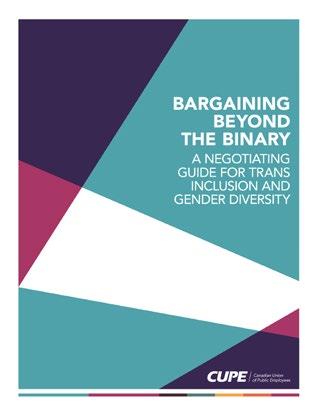
CUPE FOCUS 16 INCLUSIVITY
CUPE BC donates $10,000 to restore veterans memorial
KIMBERLEY CUPE BC has donated $10,000 to a local veterans group after a dozen memorial plaques were removed and another damaged by vandals last June. The plaques contained facts about Canada’s historical contribution to global conflicts, serving as a local memorial for those from the region who gave their lives in world wars and other conflicts.
“It was so sad to hear about this senseless act of vandalism,” said CUPE BC Secretary-Treasurer Trevor Davies. “Objects can be replaced, but these memorials were more than objects—they represented the lives sacrificed by Canadians, and the families who lost loved ones as a result.”
Many of the stolen plaques had been donated to the park in support of military families. The CUPE BC donation, to the local veterans group Military Ames, will make a substantial contribution to creating new plaques to adorn the park.
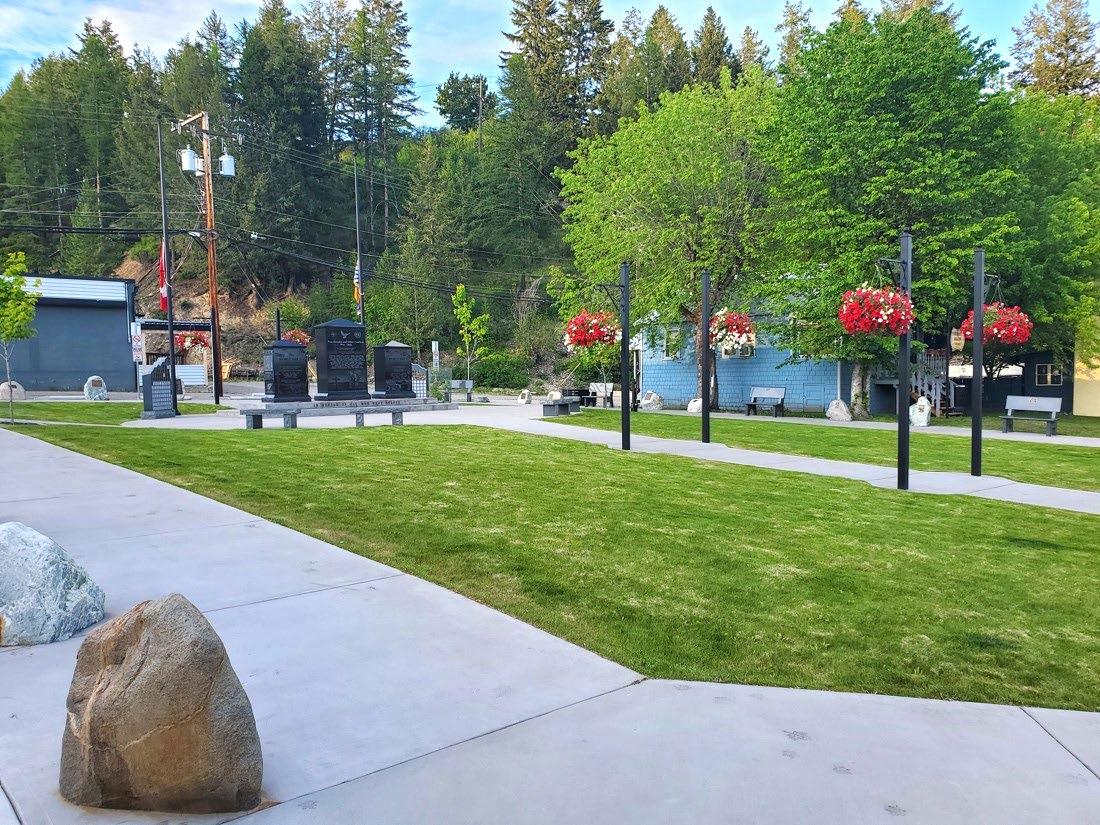
“Our members know how important it is to recognize the sacrifice and contributions of our fallen and our veterans, especially in small communities where the losses were so great and the resources to maintain these memorials is limited,” said Davies.
CUPE 403 makes $5,000 donation to Langley Foundry

LANGLEY CUPE 403, representing municipal workers in Langley, has shown significant support for the mental health and well-being of their community by donating $5,000 to the Foundry Langley, an organization that will provide access to mental health and substance use support, primary care, peer support and social services for Langley children, youth, and families. The centre is under development but will be open for service in the fall.
“Supporting youth in need through a culture of care is critical to keeping our community healthy and safe,” said CUPE 403 President Sara Manchester.
“Early intervention and connection with vital resources and community supports will change so many people’s lives for the better.”
MEMBERS MAKING A DIFFERENCE 17 CUPE COMMUNITIES
RESPECTING OUR HEROES In Kimberley’s Veterans Memorial Park, a CUPE BC donation will help create new plaques, replacing those damaged by vandals, to commemorate the contributions of local veterans during global conflicts.
STRENGTHENING OUR COMMUNITY Members of CUPE 403 pose with a cheque to Foundry Langley that will contribute to social service support for local kids and families.
ON THE LINE From top, CUPE members showed solidarity with striking members of IOUE 115 and Teamsters 213 on Mitchell Island in Richmond on May 26; locked out ACTRA members in a direct-action rally on July 11 in Vancouver (above); striking BCGEU members in Kamloops on August 19; and Local 502 of the International Longshore and Warehouse Union (ILWU) in Delta on October 2.

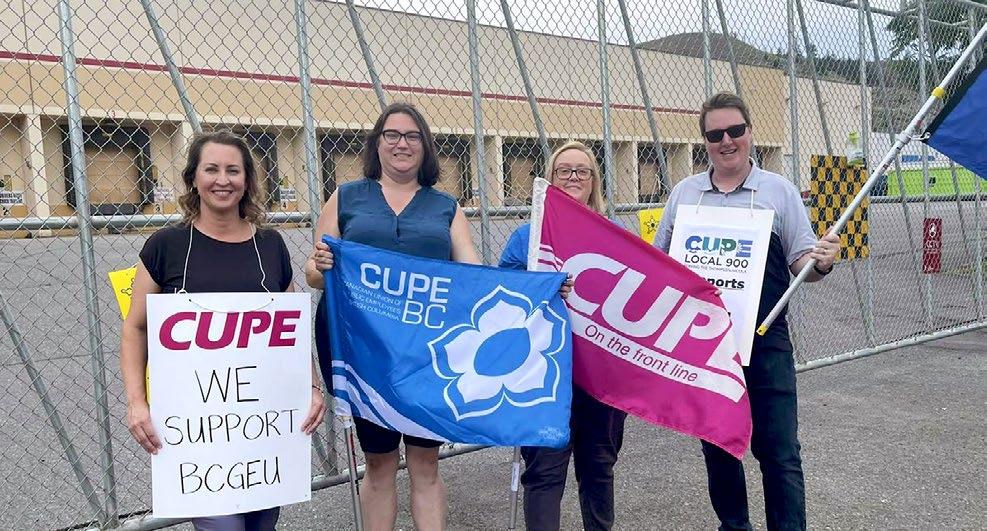

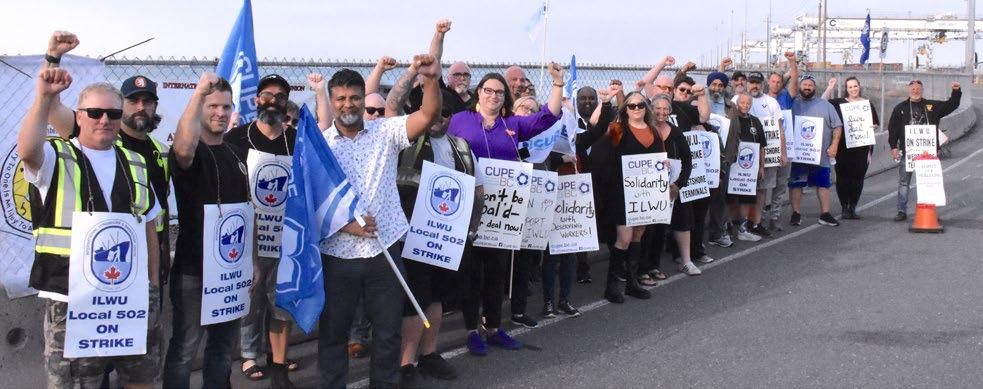
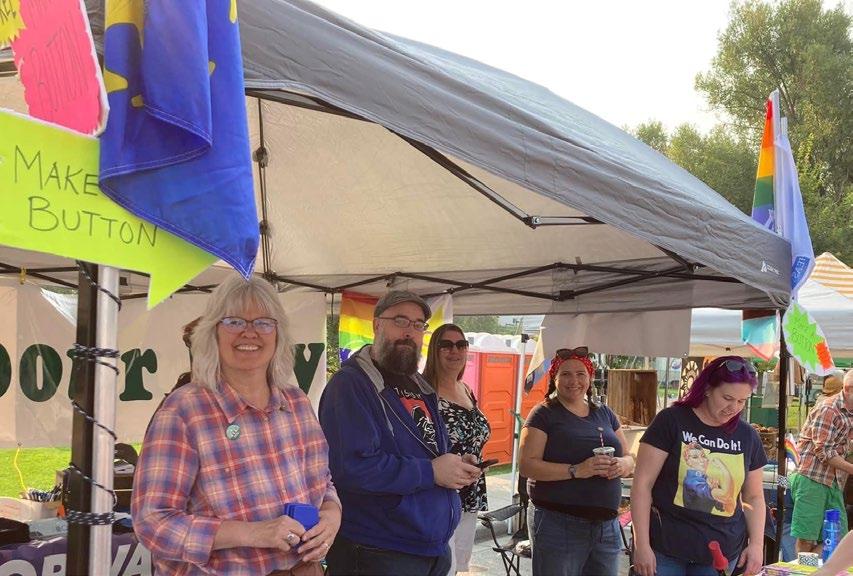
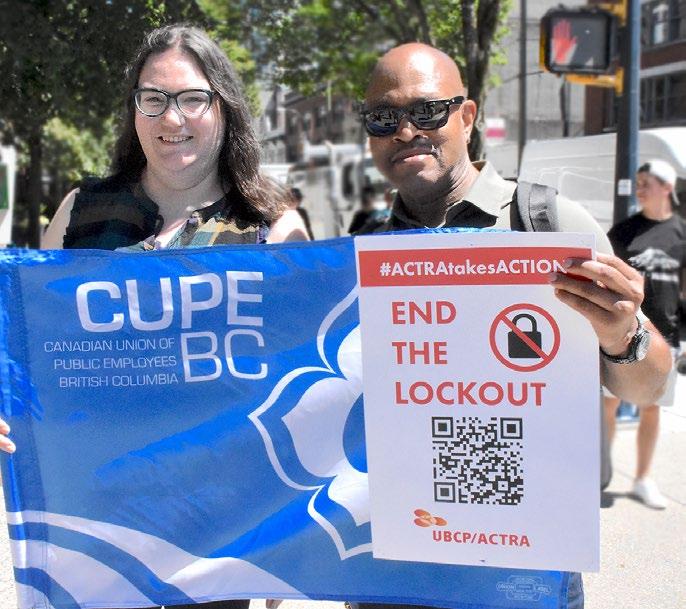
CUPE GALLERY 18
HONOUR OUR VICTORIES, FIGHT FOR THE FUTURE CUPE members celebrated Labour Day from the Lower Mainland (left) to the Kootenays on September 5.
KOOTENAY DISTRICT COUNCIL PHOTO
A solid sense of community
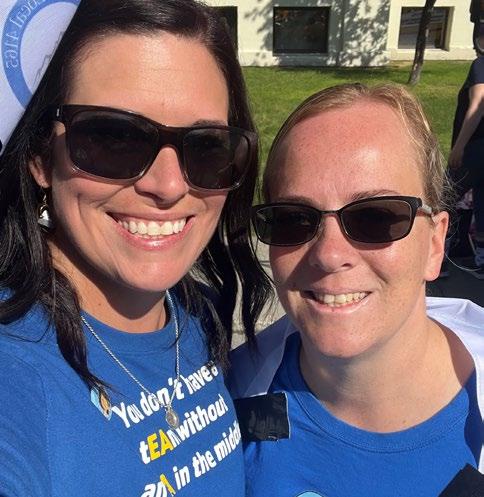

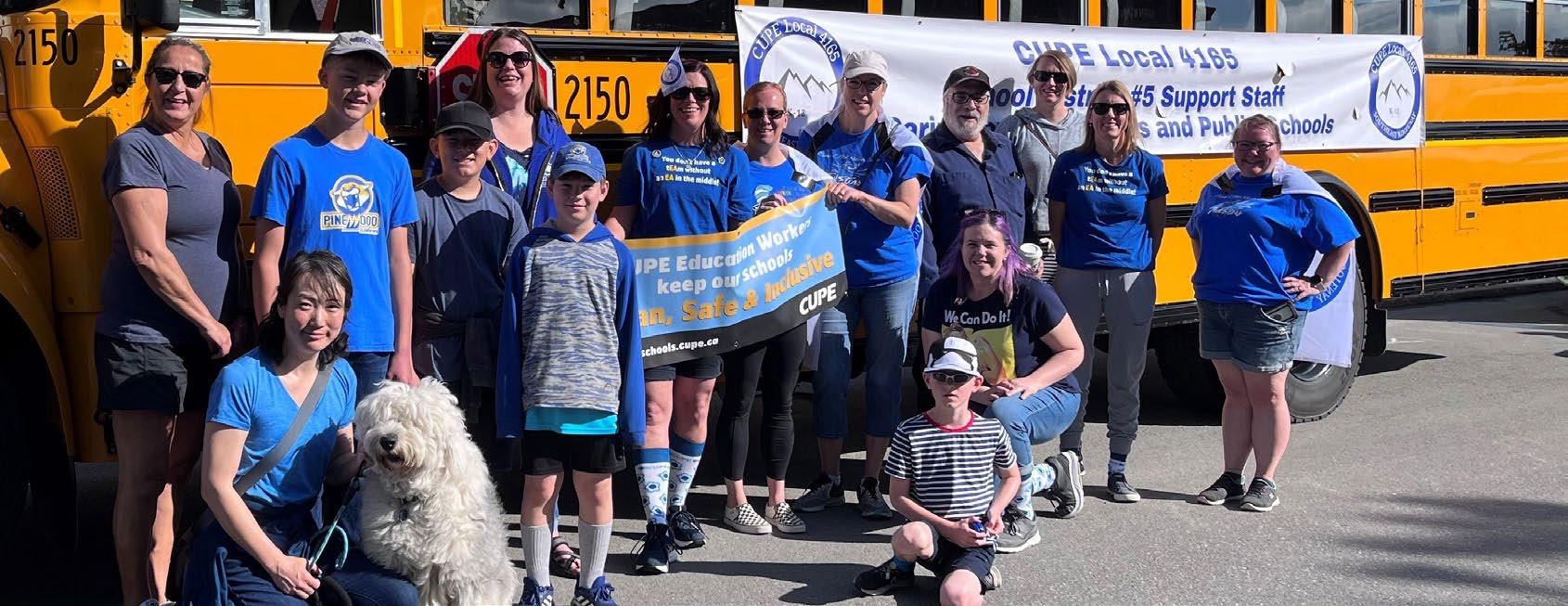
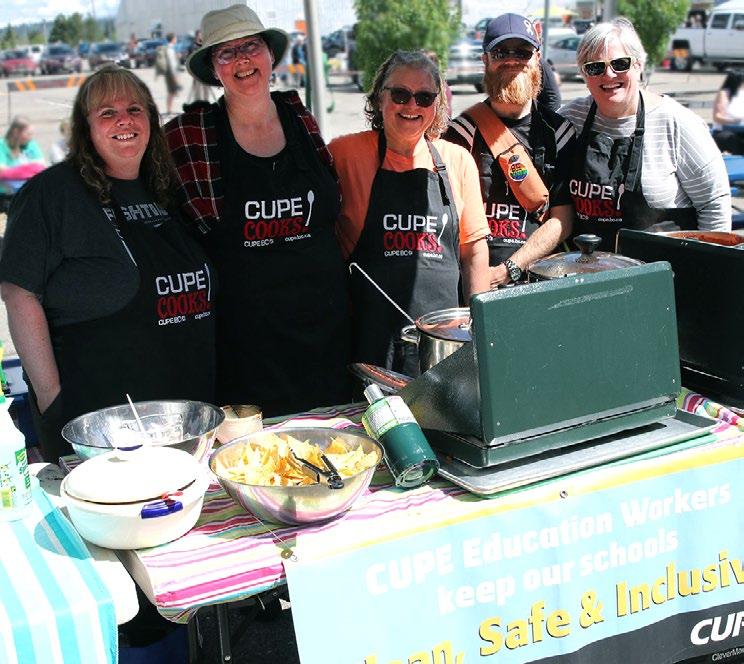
Head
in 1887, Superintendent Steele was said to have drawn admiration from friend and foe alike for his strength of character and his commitment to community. Sam Steele Days, a popular three-day festival in Cranbrook run by a non-profit volunteer organization bearing his name, unites local businesses, clubs, organizations and performing artists in a fun-filled showcase of civic pride. Members of CUPE 4165 (School District #5 support staff) were front and centre at this year’s Sam Steele Parade, held on June 18.
19 CUPE GALLERY
CUPE COOKS Members of CUPE 3742 (Prince George school district support staff) came together for the 45th annual chili cookoff at the CN Centre on June 11. With only two hours to prep, and hundreds to serve, it was a great team effort!
CONNECTING LOCALLY BCNDP MLA and now Premier David Eby joined CUPE BC members and staff at the Union of BC Municipalities convention (September 12 – 16) in Whistler.
Sam Steele was a legendary figure in the history of the Canadian West.
of the North-West Mounted Police’s “D” Division during the march to Kootenay Post
STEELE PRIDE CUPE 4165 VicePresident Sarah Mooy and Local member Ruby Kozicky, both education assistants, take in all the action. (Photos by Sarah Mooy)
CUPE 3742 PHOTO
Archiving six decades of union activism at SFU
CUPE BC’s history was on display this summer at Simon Fraser University. A special exhibit on the university’s Burnaby campus highlighted the nearly 60 years of our union’s activism and advocacy with a display of historical materials donated by CUPE BC.
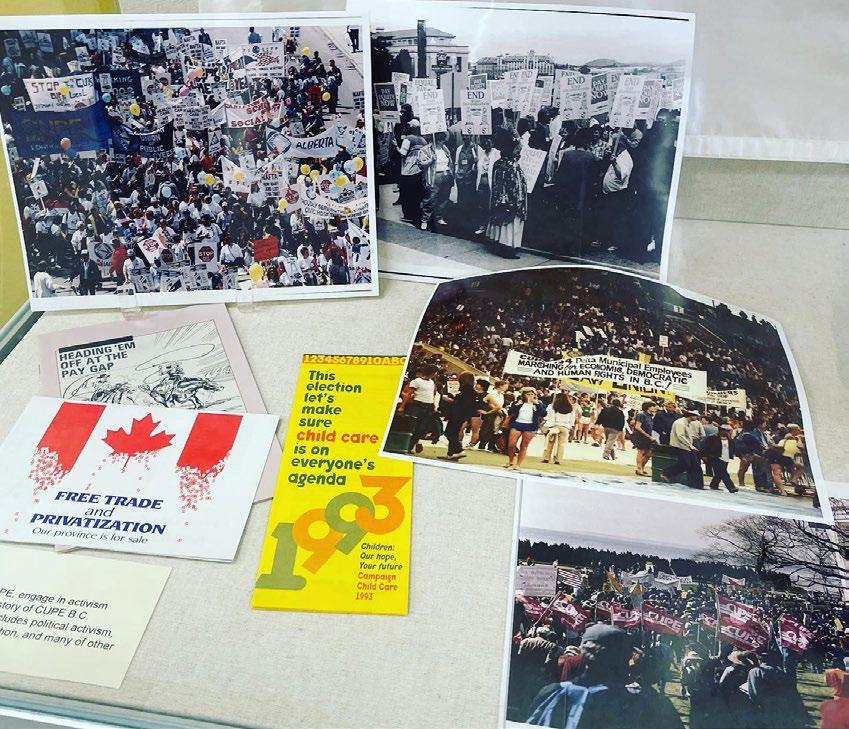
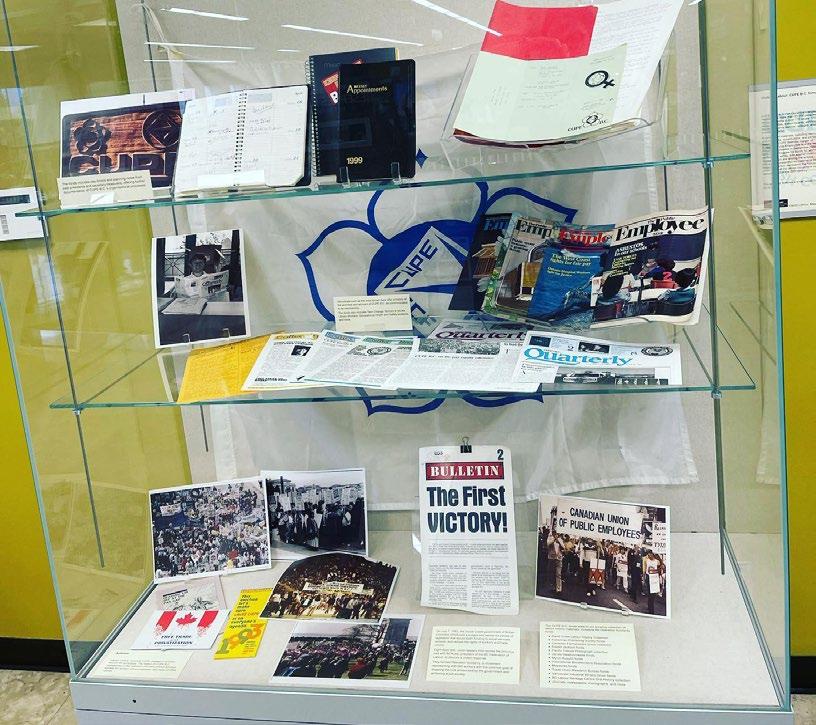
The Visible Labour: Activism and Solidarity in the CUPE BC Fonds exhibit featured a selection of photos, newsletters, bulletins, convention kits dating back to the founding of CUPE BC, and even the earliest editions of Public Employee. (In archival science, a “fonds” is a group of documents that share the same origin and are generated naturally through the daily workings of an organization –such as CUPE.)
Collector’s items from our history
A unique opportunity recently arose to preserve and display the union pin collection of the late Ray Whitehead, a long-time CUPE Representative and former Regional Director.





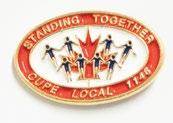



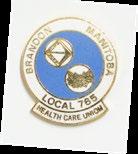

“We were contacted by Ray’s family and asked if we wanted his extensive pin collection,” says CUPE BC Secretary-Treasurer Trevor Davies. “It was such a generous offer, and a special opportunity for CUPE BC to showcase labour history though pins.”
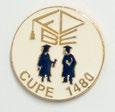


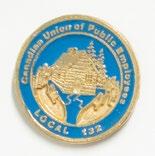


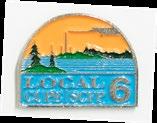
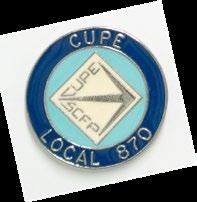


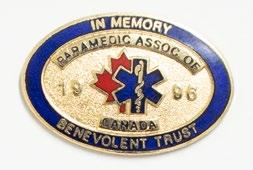


Davies says CUPE BC has asked CUPE 23 member Peter Musser to help catalogue the pin collection. Once complete, the collection will be on display at the CUPE BC office.
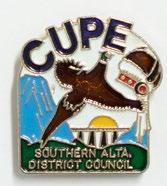
The exhibit was curated by David Kloepfer, a member of CUPE 3338 who works with the SFU library’s special collections. The materials he selected are just a sample of the CUPE BC historical collection housed at SFU. The collection preserves the history of CUPE in our province, from the union’s founding in 1963 to more recent years, chronicling our members’ struggles for equity for women, better childcare, and workplace safety, and against contracting out.
With the support of CUPE and the B.C. Division, the collection has also been digitalized and can be viewed online at digital.lib.sfu.ca
CUPE COMMUNITIES 20 MEMBERS MAKING A DIFFERENCE
PROUD HISTORY A couple of the displays from CUPE BC’s Visible Labour exhibit at SFU—including the earliest issues of Public Employee. Photos by CUPE BC President Karen Ranalletta, who visited the union’s fonds exhibit this summer during its five-month run.
SOLEMN OCCASION
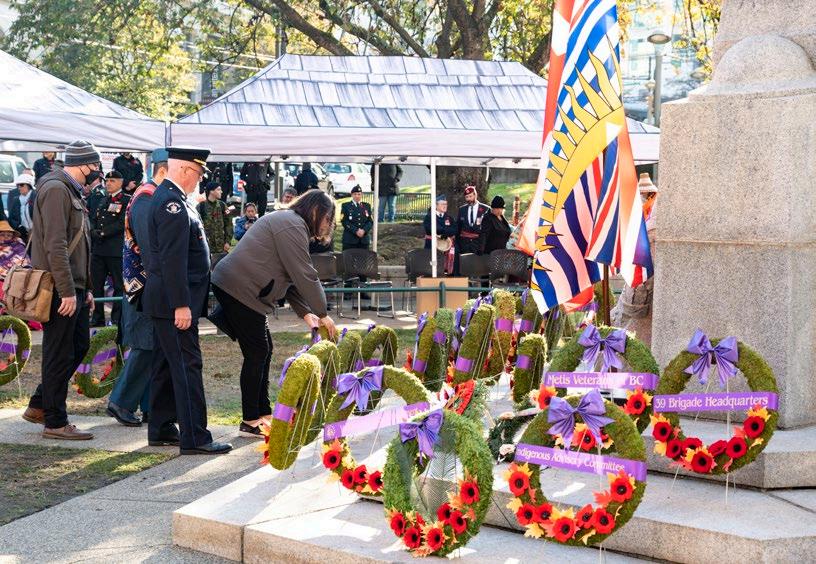
More than 125 people gathered at Surrey’s
Creek Park on May 5 to mark the National Day of Awareness for Missing and Murdered Indigenous Women, Girls, Two Spirit and Non-Binary People. The event was organized by CUPE 728 (Surrey Schools) with assistance from the Hospital Employees’ Union.
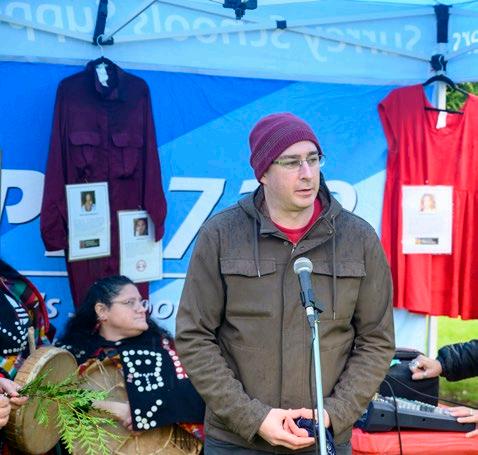
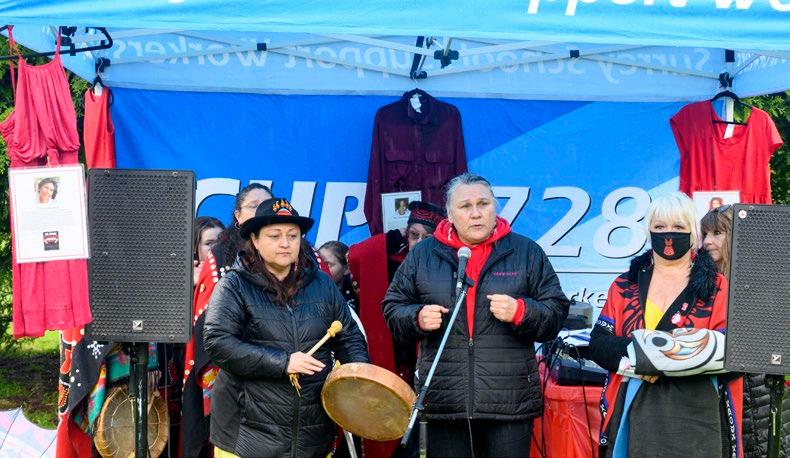
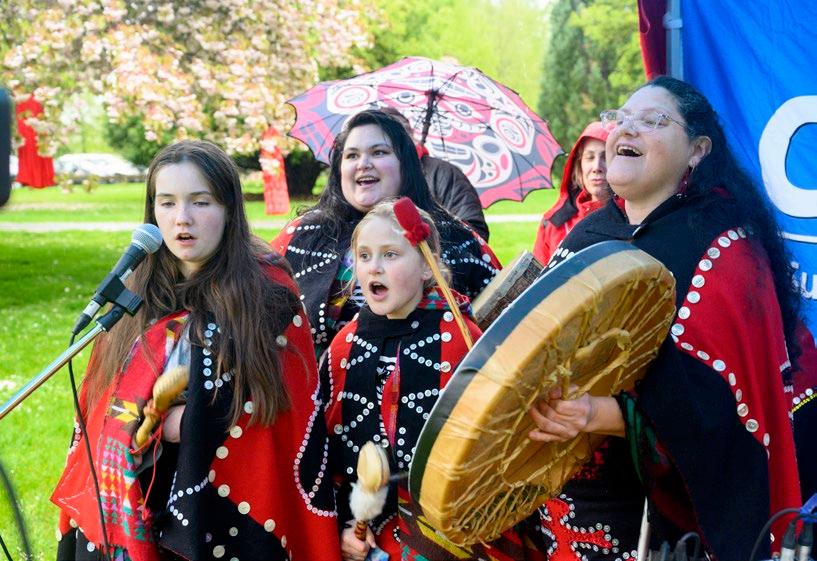
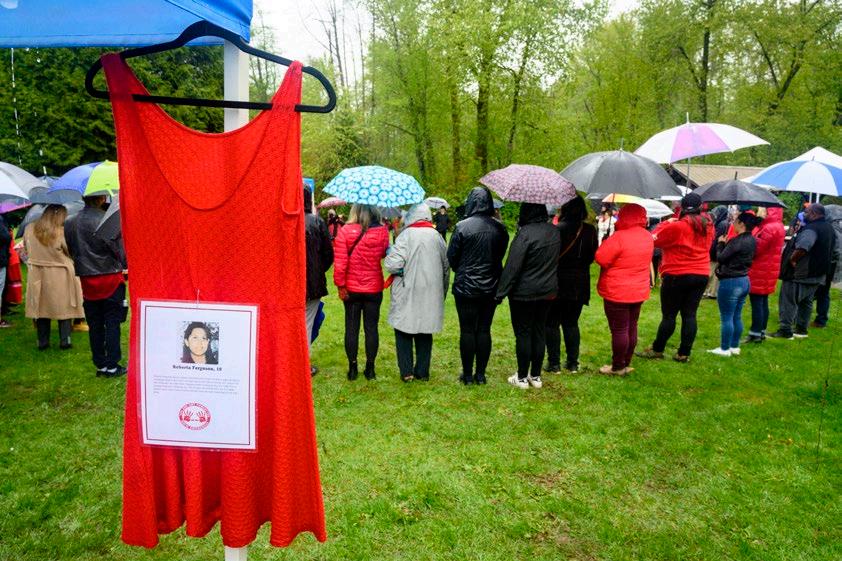
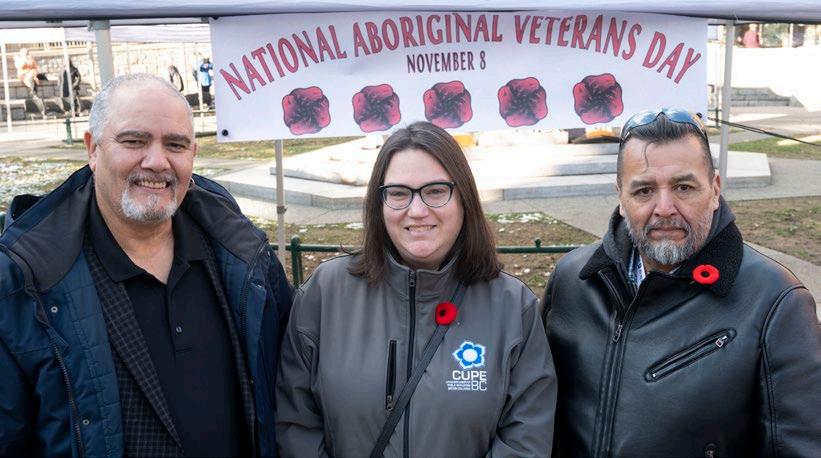
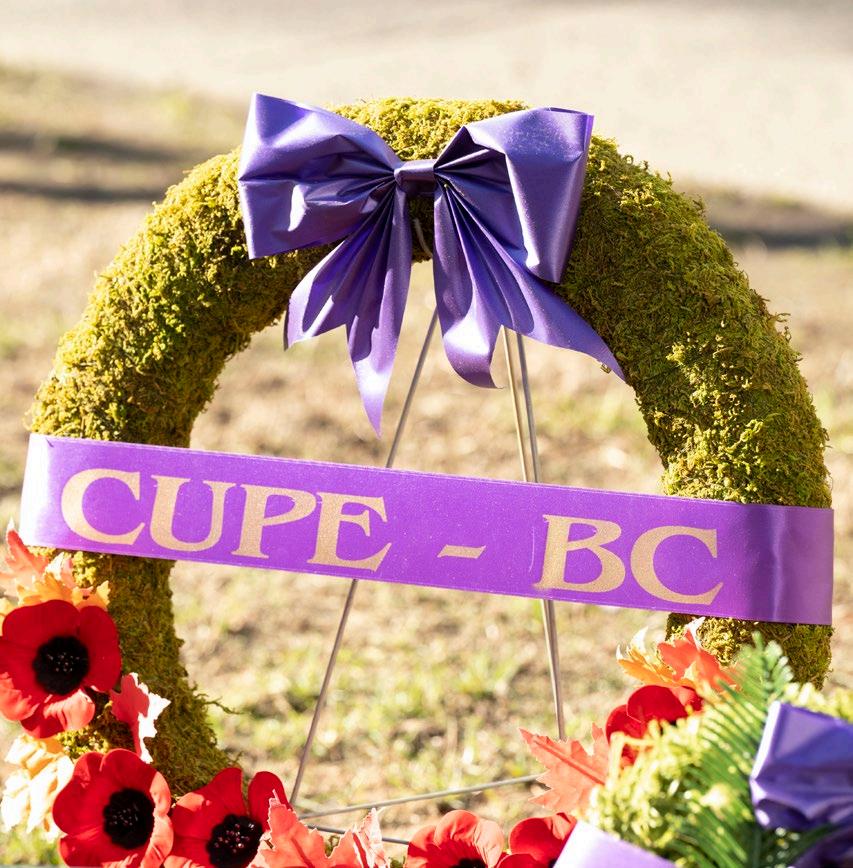
21 CUPE GALLERY
HONOURING INDIGENOUS VETERANS CUPE BC President Karen Ranalletta and CUPE 15 President Warren Williams accompanied CUPE 15 member, Elder Sam George, at a wreath-laying ceremony honouring the contributions of Indigenous war veterans on November 8.
Bear
When it was first suggested that my column for this issue address the realities of inflation in today’s economic climate, my first thought was: well, there’s the fastest way to stop members from reading another sentence! (Or to provoke enraged responses, in all caps, offering no end of competing theories.) But these are tough times, indeed, so here goes…
Yes, the current rate of inflation hurts. It doesn’t take a rocket scientist to know that. But all talk of a pending or current recession and how severe it will be does nothing but spread fear and anxiety. The one item I want to address is the recent trend of politicians blaming a single source for rising inflation.
Don’t look for a scapegoat
We consistently hear voices asking us to blame greedy grocery stores, pandemic spending, foreign wars, or government “waste,” et cetera, for inflation. Unfortunately, political populism thrives when people are desperate, and this preys on people’s suffering and desire for a resolution. I see many opportunists looking to cash in for their own benefit, selling simplistic interpretations of a complex situation simply to fit a narrative that serves their own purpose.
My point is this: there is no one, single bogeyman. The inflation we have is “sticky.” Economists and academics use this term to describe a situation where many goods and services simultaneously have price increases. This can be differentiated from a situation where only one or two items are going up in price while everything else remains the same.
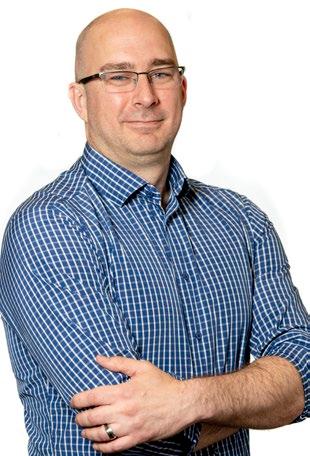
One recent example would be rising housing and fuel prices. When there is only an item or two causing inflation, governments have more ability to respond by focusing on these products or sectors (whether they actually fix anything is another story). With
BEAT INFLATION
sticky inflation, by contrast, everything is going up; there isn’t one solution required, but hundreds.
We’ve been bombarded with news stories about the Bank of Canada raising interest rates in response to increased inflation. In a situation of rising costs, the Bank is doing what it is designed to do in this situation: increasing interest rates to put downward pressure on the demand side of spending and borrowing. These increases also ensure that fair rates are paid to people with savings (for school, retirement, buying a home, or for a rainy day), ensuring that the money people have saved keeps pace with rising costs.
We are not powerless—it’s time to get active!
There is no one enemy or single fix, and simply calling for political interference in the Bank of Canada is not the solution to building more affordable communities. We need smart, progressive solutions that make us less reliant on the market system, moving beyond the market to strengthen and expand public services. Addressing the housing crisis with more non-market building, improving social services, lowering the cost of post-secondary education, and creating a system of universal public childcare are just some of the solutions on which we need to focus our energy and activism.
So, what can you do? Being part of a union helps. But the union isn’t something that operates without you, and it’s something you’re a part of. At this time, more than ever, we need more activists to get involved, attend meetings, learn advocacy skills, and become politically active.

Our job is to fight for improved working conditions and economic justice for our members. What we can’t achieve at the bargaining table, we can win through political action. But political action victories don’t happen without you. We need your activism and participation to strengthen public services and education—our best defence against unexpected inflation and interest rate hikes.
That’s the action we’ll need in 2023.
TREVOR DAVIES, SECRETARY-TREASURER POWER IN NUMBERS 22
There’s no single inflation bogeyman BUILDING PROGRESSIVE PUBLIC SERVICES IS THE BEST WAY TO
FOLLOW TREVOR ON TWITTER @TreasurerTrevor
“We need smart, progressive solutions that make us less reliant on the market system.”
MAKING SENSE Trevor Davies addresses delegates at the joint annual conference of the BC Municipal Safety Association and the Public Works Association of BC. CUPE BC and WorkSafeBC were partner sponsors of the October 4-5 event in Vancouver.
PHOTO COURTSEY OF BC MUNICIPAL SAFETY ASSOCIATION
Over his eight years as BC NDP Leader, five of those as premier of our province, John Horgan demonstrated tremendous leadership. He took on the wealthy and well connected, advanced the issues that matter to working people, and made real change to create a better B.C. for everyone.
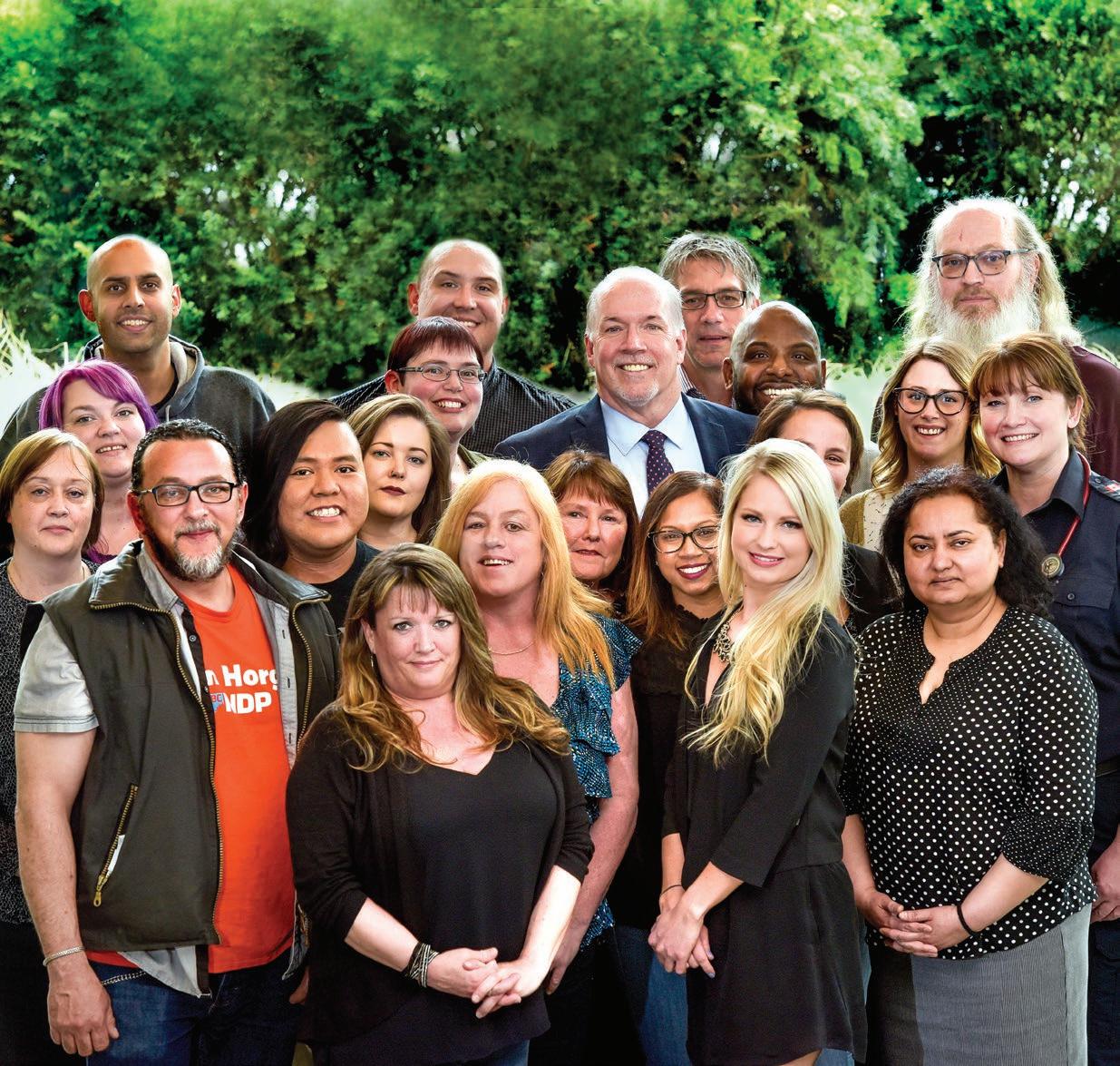

POSTAL AGREEMENT # 42016512
TOLL FREE:
E:
PRESIDENT Karen Ranalletta SECRETARY-TREASURER Trevor Davies EDITOR Dan Gawthrop EDITORIAL TEAM Steven Beasley Kathryn Davies Greg Taylor PHOTOS CUPE Communications and Josh Berson COVER PHOTO Steven Beasley GRAPHIC DESIGN Pete Tuepah and Nadene Rehnby, Hands On Publications CUPE
acknowledges that our province of British Columbia is located on the homelands of Indigenous nations and cultures.
ON BEHALF OF THE MORE THAN 100,000 CUPE MEMBERS IN B.C., THANK YOU, JOHN HORGAN!
PUBLIC EMPLOYEE PUBLISHED BY Canadian Union of Public Employees, British Columbia Division 410 – 6222 Willingdon Ave. Burnaby, B.C. V5H 0G3
T: 604.291.9119
1.877.263.8568
info@cupe.bc.ca
BC
Thank you, John!
Karen
Ranalletta Trevor Davies President Secretary-Treasurer


































PM#42016512


























 By Usman Mushtaq
By Usman Mushtaq












































































